#me putting in ways to kill abstract concepts in my settings for no real reason
Text
Fantasy races are an uncomfortable concept, because they present a world that literally works the way racists think that it works. The attempts to mitigate this problem often fail to address the core concern, merely making the idea more palatable.
A big example is trying to correct by changing the language from "races" to "species." This attempt fails for two reasons:
1) Exactly! Racists think that people of other races are a different species. That's the foundation of "race science," phrenology, all of it.
2) Are demihumans different species, though? Like, the interactions between elves and dwarves don't resemble the interactions between different species in our world. They don't act like snakes and lemurs, or whales and krill, or even cats and dogs. More often we've got different groups of people, who may speak different languages and have different cultural practices, engaging in diplomacy or war and struggling to coexist. In practice, they are treated as nations: ethnicities. Except they're ethnicities who are biologically distinct enough to have objective differences in ability.
This is something that puts me on edge in Mass Effect, otherwise one of my favorite games. True, the game ultimately lands on condemning the genophage, and it's not subtle about that. I mean just look at the name... But it's still considered debatable, morally grey, and Mordin Solus remains one of the most charming and enduring heroes of the series. The setting has bent over backwards to make every racist stereotype and talking point as legitimate as possible. In this setting, it is objectively true, scientifically proven that it is in the DNA of Krogans to naturally be violent, warmongering killing machines whose explosively rapid breeding poses an existential threat to the galaxy. That in turn is meant to make us think that maybe forced sterilization is something worth considering. It's hard to ignore the parallels to real life racist propaganda. I don't think it's malicious, just ungrounded and thoughtless; the result of creators to whom these ideals are abstract thought experiments, rather than reflections of real history.
Another big example is Dark Elves. They try to make it okay, to mitigate the message by fleshing them out as characters, by scapegoating an abusive deity rather than an ingrained nature, by erasing the monster manual description that reads "Always Chaotic Evil," by trending skin tone away from black and towards purple, or gray, even pale white. But none of it really changes the core issue, does it? The idea of drow is to equate dark skin with evil, to fetishize that idea, and to tell a story about a subsect of people cast into darkness as a result of sin in a direct parallel to racist Christian beliefs about dark skin being a curse or punishment from God.
So, do I think we need to cancel Mass Effect and stop playing D&D or telling stories about drow? No, not really. I mean... I do all these things. Truth is, I don't have an actionable solution, for myself or anyone. But the dynamic is clearly present and worth describing. And the attempts to challenge it are often insufficient, more about making ourselves feel better about what we're already doing than enacting real change.
1K notes
·
View notes
Text
Top 10 Most Anticipated Films of 2020
Now I’ve got my embarrassingly late ‘Best of 2019′ list out of the way, I can finally proceed to the list that’s probably more exciting - my most anticipated films of 2020!
This list excludes films that have already been screened at festivals (otherwise, stuff like Saint Maud would be here). It’s also somewhat analogous to groping about for a light switch in the dark - these lists very rarely accurately predict my ultimate favourites for the year, so it’s more of a fun speculative exercise. Hopefully this puts some intriguing-looking films on your radar for the year ahead!
1. Dune (dir. Denis Villeneuve)

Plot: The story of Paul Atreides (Timothée Chalamet), a brilliant and gifted young man born into a great destiny beyond his understanding, who must travel to the most dangerous planet in the universe to ensure the future of his family and his people.
Why be excited? The reasons to be excited about Dune should be pretty self-evident - it’s directed by one of the greatest filmmakers working today (Villeneuve’s Incendies and Blade Runner 2049 are all-timers for me), and is based on one of the best science-fiction novels ever written. The cast - Timothée Chalamet, Rebecca Ferguson, Oscar Isaac, Javier Bardem, Charlotte Rampling, and more - is absolutely stacked with talent. There’s every reason to believe that this will be something special, and I couldn’t be more pleased that Villeneuve is the man responsible for filling that Star Wars-shaped hole in the December release schedule.
2. Annette (dir. Leos Carax)
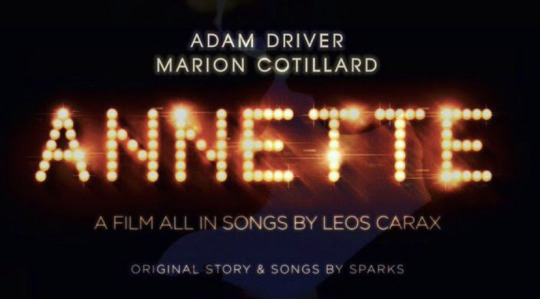
Plot: A stand-up comedian (Adam Driver), and his opera singer wife (Marion Cotillard), have a two-year-old daughter with a surprising gift.
Why be excited? You may not have heard of him, but Leos Carax is one of the most exciting directors working - he only makes around one film a decade, but the films he does make tend to be very special. I’ve only seen one film of his - Lovers on the Bridge - but that was filled with such ecstatic romance and wondrous visuals that it made me tremendously excited for Annette. Annette is a top-to-bottom musical with songs by American duo Sparks (if you know them for anything, it will be ‘This Town Ain’t Big Enough for the Both of Us’), and said songs will be delivered by Adam Driver and Marion Cotillard. It goes without saying that both actors are extremely talented performers with great voices (see Driver in Marriage Story and Cotillard in Nine for evidence), and I’m looking forward to seeing how they demonstrate their talents here.
3. Last Night in Solo (dir. Edgar Wright)
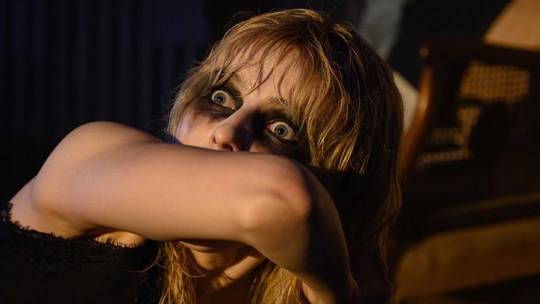
Plot: A young girl (Thomasin McKenzie), passionate in fashion design, is mysteriously able to enter the 1960s where she encounters her idol, a dazzling wannabe singer (Anya Taylor-Joy). But 1960s London is not what it seems, and time seems to fall apart with shady consequences.
Why be excited? I’m not the biggest Edgar Wright fan, but I admire him greatly and the premise of Last Night in Soho is like cat-nip to me. Speaking to Empire, Wright explained the story as follows: “I’m taking a premise whereby you have a character who, in a sort of abstract way, gets to travel in time. And the reality of the decade is maybe not what she imagines. It has an element of ‘be careful what you wish for’.” I’m a sucker for a good, old-fashioned high concept, especially when said films play with genre and really challenge the viewer. The two female leads - Thomasin McKenzie (JoJo Rabbit, Leave No Trace) and Anya Taylor-Joy (The Witch, Emma) - are among the very best young actors working today, and the supporting cast features absolute legends such as Diana Rigg and Terence Stamp. Whether it’s successful or not, this film feels like a genuinely original prospect and I’m eager to see how it turns out.
4. The Green Knight (dir. David Lowery)
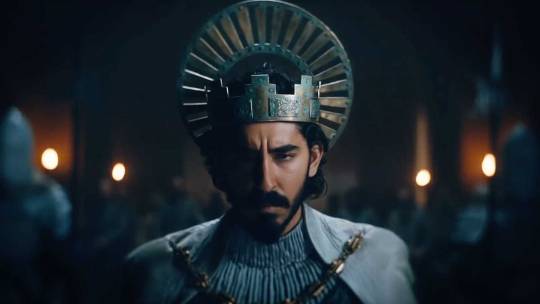
Plot: A fantasy re-telling of the medieval tale of Sir Gawain and the Green Knight.
Why be excited? There has been a sad lack of films based on mythology in recent years - or, to be more accurate, there has been a sad lack of films that attempt to honour what the myths were actually trying to convey. The stunning trailer for Green Knight promises a film that genuinely engages with its source material, and is just as interested in the psychological truths of the tale as the spectacle of its fantastical scenarios. Dev Patel is an extremely talented actor coming off another great movie in The Personal History of David Copperfield, and the supporting cast (Alicia Vikander!) appear to be fully committed to their parts. I’m excited to see a true myth on the big screen again, and David Lowery (A Ghost Story, The Old Man & The Gun) can be trusted to give an old tale a new sense of vitality.
5. The French Dispatch (dir. Wes Anderson)
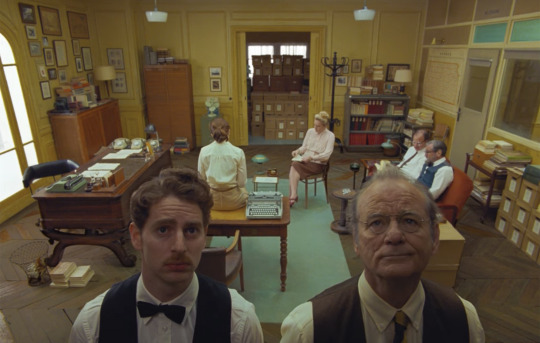
Plot: The staff of a European publication decides to publish a memorial edition highlighting the three best stories from the last decade: an artist sentenced to life imprisonment, student riots, and a kidnapping resolved by a chef.
Why be excited? It’s a Wes Anderson movie! Of course I’m excited! In all seriousness, the trailer was all I needed to get hyped about this. It’s clearly Anderson’s quintessential style, but it also shows flashes of some very bold and striking compositions (yes, I’m thinking of Chalamet on the back of that motorcycle) that you wouldn’t necessarily think of in relation to him. I’m intrigued by the prospect of there being stories nested within a story, which feels like the perfect choice for the structure of a film about a newspaper. The cast features all of Anderson’s old favourites (Swinton! Murray! McDormand!), as well as some exciting new additions (Timothée Chalamet, Elisabeth Moss, Christoph Waltz, among others) that feel so well-suited to his style it’s surprising they haven’t worked together before. Bring on all those immaculately composed shots and exquisite colour palettes.
6. Tenet (dir. Christopher Nolan)
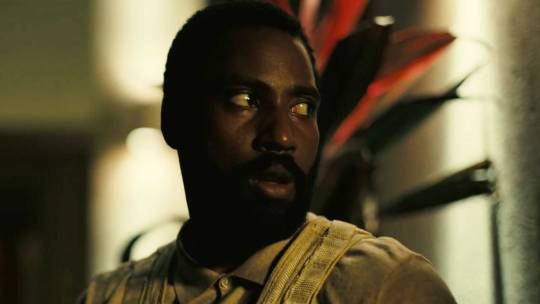
Plot: Unknown. The project is described as an action epic revolving around international espionage.
Why be excited? I hate to sound repetitive, but ... it’s a Christopher Nolan movie. That alone is enough to be hyped about this. Details of the plot are vague for now, but the teaser suggests the sort of intelligent, high-concept film-making we’ve come to expect from Nolan. John David Washington - who impressed in BlacKkKlansman - is a great choice for the lead, and I also love that Tenet will feature Robert Pattinson and Elizabeth Debicki (among my favourite actors) in prominent roles. There’s not much else to say given how little we know about this, but suffice to say I’ll be there on day one!
7. Wonder Woman 1984 (dir. Patty Jenkins)

Plot: Wonder Woman (Gal Gadot) comes into conflict with the Soviet Union during the Cold War in the 1980s and finds a formidable foe by the name of the Cheetah (Kristen Wiig).
Why be excited? The original Wonder Woman was an absolute delight, and I couldn’t be more pleased that Patty Jenkins is back to continue Diana’s story. The decision to pick up with Diana in the 1980s is most intriguing (and paves the way for all kinds of exciting choices when it comes to the music and the fashions), especially since it looks like the film is actually going to explore the implications of being an immortal being in a mortal world.
8. Raya and the Last Dragon (dir. Paul Briggs and Dean Wellins)
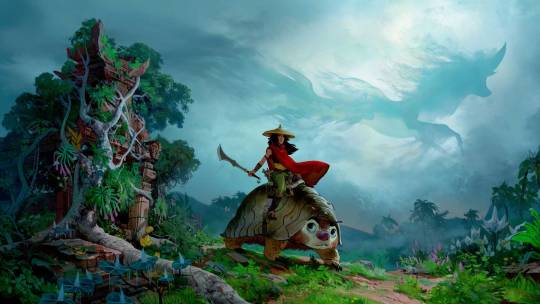
Plot: A lone warrior from the fantasy kingdom of Kumandra teams up with a crew of misfits in her quest to find the Last Dragon and bring light and unity back to their world.
Why be excited? The animation scene in 2020 looks kind of ... blah at the moment, with the notable exception of Raya and the Last Dragon. The setting was described by the film’s producer as "a reimagined Earth inhabited by an ancient civilization that venerated the mythical dragons for their power and their wisdom”, and that alone is enough to fire up my imagination. Off the back of Moana and the Frozen films (which I all unabashedly love), I trust Disney Animation to instil this with plenty of colour and verve.
9. I’m Thinking of Ending Things (dir. Charlie Kaufman)
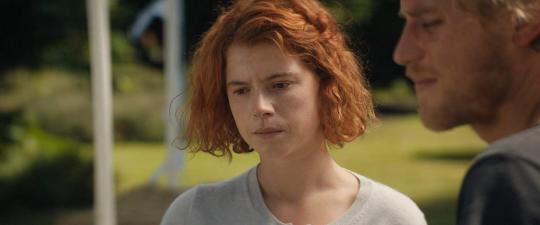
Plot: An unexpected detour turns a couple’s road trip into a terrifying journey through their fragile psyches.
Why be excited? Directed by Charlie Kaufman (writer of Eternal Sunshine of the Spotless Mind), I’m Thinking of Ending Things is based on a prize-winning novel. However, despite the pedigree the main reason I’m looking forward to this is Jessie Buckley. Buckley gave a star-making performance in Beast a few years ago, and has since proven herself an actor of immense talent and skill (see Wild Rose for proof of what a powerhouse she is). I’m excited to see her career continue to go from strength to strength, and I’m Thinking of Ending Things seems poised to be a great showcase for her.
10. The Last Duel (dir. Ridley Scott)

Plot: King Charles VI declares that Knight Jean de Carrouges (Matt Damon) settle his dispute with his squire (Adam Driver) by challenging him to a duel.
Why be excited? Ridley Scott is a bit of a mixed bag for me, and has never come close to reaching the heights of Alien and Blade Runner with his recent work. Nonetheless, against my better judgement I can’t help but be excited by the prospect of a medieval epic with Scott at the helm. The acting talent attached to The Last Duel is top-notch, and I’m particularly fond of Jodie Comer (of Killing Eve fame) and Adam Driver (do you really need me to say more?). There’s a very real danger of the highly sensitive plot (the ‘dispute’ at the heart of the story concerns an accusation of rape, the truth of which is to be determined with a duel) being mishandled by Scott, but the involvement of screenwriter Nicole Holofcener gives me some hope. This could turn out to be a misfire, but my hope is that it will, at the very least, be interesting.
#dune#annette#last night in soho#green knight#the french dispatch#timothee chalamet#Adam driver#jessie buckley#the last duel#i'm thinking of ending things#raya and the last dragon#wonder woman 1984#tenet#films#2020 in film#cinema
135 notes
·
View notes
Text
Philosophical approach to Atheism
General social survey, which is a sociological survey department created by national opinion research center at the University of Chicago. In their statistics claims that in the year 2000, 8 percent of the U.S. population identified themselves as atheists, which grew exponentially to 21 percent in the year 2014 and has gained momentum, since then. Atheism taking its roots, it’s time we ponder over atheistic approach to life. Simply put, it’s a lack of belief in the existence of God or any metaphysical or spiritual being for that matter. But what drives this “lack of belief”? Which, I believe itself is a belief system. Atheist also call themselves rationalist, which in philosophy means a person who ‘regards reason as the chief source and test of knowledge’. Being rationalist, not all atheists deny the existence of a supreme power, some argue the lack of evidence, some call it a hypothesis and some claim that the theist belief stems from evolutionary adaptation for the belief in which God gives purpose to life. Philosophy however, being a study of knowledge, reality and existence has an unbiased take on both atheism and theism.
If theist have the challenge of proving the existence of all an powerful God, Atheists have the burden of solving the problem of abstract concepts that we know is present viz. wisdom, civility, intuition, morality… and many more, The disbelief gives rise to complexity in understanding of innumerable abstract concepts that is derived from the belief in a higher super natural power. Let’s take a look at how atheism explains morality, one of the abstract concepts, possibly the most crucial of all.
Is morality Intelligible?
Morality is one of the factors that distinguish the Human race from rest of the animal kingdom. It determines our methodological approach to good or bad, right or wrong, fair or unfair, just or unjust… the list could go on. An intangible, indefinitive abstract idea that shapes our behavior, way of life and even the law of the land we live in. But what is morality and where does it come from? Well, for theist the answer is simple, a God given gift, something that makes Homo sapiens superior and for some simply the proof that God exists. Let’s talk about the atheistic philosophical approach to morality or/and if morality even exist in an atheistic world view. There are numerous approach to morality in the philosophical realm in a quest to understand or define morality, for instance, the 18th century utilitarian theory put forward by Jeremy Bentham and John Stuart Mill which states that,
“A person ought to act so as to maximize pleasure and minimize pain.”
They stress on the idea that the moral grounds are determined by the outcome of the act. something is morally good if it increases pleasure or decreases pain and bad if it decreases pleasure or increases pain. Sounds like a valid point. But isn’t pleasure subjective, i.e., doesn’t it depend on personal experiences and preferences. If so, why is that something called core morality even exists? Why do we know for sure that killing or rape is definitely wrong? That knowledge stems from our core morality. Even if we, for the sake of argument nod our heads to the definition of morality proposed by atheistic world view and agree to the argument posed, that morality is a product of evolution over time derived by the acts of pleasure and pain, from a robbers perspective robbing is pleasurable does that make stealing morally sound? Or even a murder for that matter? It is inconceivable to accept or relate to the idea that morality or ethics are psychological evolutionary results like there are biological. As Rosenberg Alex, in his book ‘The atheist’s guide to reality’ states,
“Is natural selection so smart that it was able to filter out all the wrong, incorrect, false core moralities and end up with the only one that just happens to be true? Or is it the other way round, Natural selection filtered out all but one core morality, and winning the race is what made the last surviving core morality the right, correct, true one. Which is it? It can’t be either one. The only way out of the puzzle is nihilism.”
In layman language atheism cannot uphold morality, therefore moral nihilism i.e., nothing is morally right or wrong is the only position atheists can hold. Which I believe we all agree to that is not true, morality is very real and it does exist. Not only it exist but also shape the world around us and the denial or inability to even explain the existence of something as basic and influential as morality is what makes me wonder how our rationalist fellow humans reason with the existence of morality.
An argument for God.
An argument generally posed by atheists is the absence of scientific evidences for the existence of God. This particular argument reveals the lack of understanding of science or scientific analysis. Science is the study of observable physical or natural world through observation of structure, behavior and patterns to arrive at a conclusion. It is as ridiculous a question as to expect science to provide us an answer for the purpose of life. It is simply beyond the scope of science. And that is the reason for the existence of a field called philosophy, to deal with intangible concepts. As philosophers are reputed to deal with what science doesn’t, many philosophers have made an attempt to deal with or prove the existence of a uncreated, free willed, all powerful, Intelligent and transcendent being who we know as God. Anselm, a philosopher from Canterbury in 11th century gave an ontological (metaphysics, that deals with nature of being) argument to prove the existence of God. Thomas Aquinas also a theist, nearly 200 years later refuted Anselm’s theory with one of his own, as in philosophy you don’t just disagree; you disagree with an argument of your own. Aquinas presented a five pointer argument to prove the existence of God, which is as follows.
1) Argument of motion
2) Argument of causation
3) Argument of contingency
4) Argument of degree
5) Teleological argument.
The first three arguments deals with cosmology and hence are called cosmological arguments. Aquinas in his argument of motion argues that, If you see a ball moving, subconsciously without giving a thought you know there is a mover, someone who set the ball in motion, which is well explained by the Newtonian law of motion, or we can say that an object in motion has set the ball in motion. But this leads to another mover who has set that object in motion and if we go on that would lead to an infinite regress i.e., a never ending chain of moving objects that has set the next object in motion unless we place a static or stationary mover in the chain of movers. But why are we talking about the movers? Universe as we know is filled with massive moving objects and hence needs a stationary mover, one who has set things in motion. Similarly, in his second argument the argument of causation, he talks about the causes of things that exists around you, everything present has a cause, every effect necessitates a cause, if something ‘caused’ has caused a cause, then, that something requires a cause and that again would lead to an infinite regress (Read that again but slowly). And this chain of causes would again require a being that is uncaused. Who, has begun the process of causation.
Every being in philosophy has been segregated into two categories ‘necessary being’ and ‘contingent being’. Contingent, in other words those whose existence won’t affect the reality as we know it, you and me my friend are contingent. Aquinas in his third argument which is really dramatically similar to the first two arguments in its aim at avoiding infinite regress, states that every contingent being has been caused by another being, and if that being is contingent too, guess what? Infinite regress!!! And to avoid that a necessary being is needed to cause all the contingent beings. Okay! But why is infinite regress such a problem? Well let’s take a practical example of infinite regress, if you ask me for a rupee, and me not having a rupee, asks a friend for the same, and that friend asks another one and the chain goes on, the rupee would practically never reach you, would it?, For the rupee to reach you someone initially has to have the rupee. For the rupee to reach you, have to avoid the infinite regress. Similarly, for the stars and the planet to be in motion, for you to be caused, we have to avoid the infinite regress or nothing would exist, the same way how the rupee would never reach you.
What is happiness without experiencing sorrow? What is relief without pain? Or good in the absence of bad? The argument of degree argues the existence of degrees for properties and states
“Properties comes in degrees,
In order for there to be degree of perfection, there must be
Something perfect against which everything else is measure.
God is the pinnacle of perfection.”
How do we know that an ‘F’ grade is bad? Because we compare it to ‘A’ i.e., something perfect and hence understand the degree of value of the remaining grades. How do we know that a person is good? We compare one’s properties to the perfect being. The last and the most popular of all of Aquinas’s argument the Teleological argument, teleology being the explanation based on an objects purpose of existence. What would come to your mind when you see a smart phone? An intelligently designed object made by its creator keeping its purpose in mind. Now take a look at the human body, every body part in a perfect ratio, 15 trillion cells, 3 billion nucleotide pairs to form one human genome, makes up 79 organs that work together in coordination with the brain and the heart to keep you alive from the day you are born to the day you die. As Stephen J Gould an evolutionary biologist states “Reply the tape a million times… and I doubt that anything like Homo sapiens would ever evolve again.” The human body is a biological and a chemical marvel. This is intelligent design. The same way none of us would assume that the smart phone came into existence without a purpose because of its intelligent design, Aquinas argues the intelligent design of human body or of the universe for that matter can’t simply be purpose less.
Yes, my article is biased towards the existence of God, that’s because the reality is biased towards the existence of God. What’s your take on the arguments… and remember in philosophy you don’t just disagree; you disagree with an argument of your own.
1 note
·
View note
Text
Creating Magic: Superpowers and Michael Jackson’s Music Videos
Introduction: It’s After Midnight (and Something Strange is Lurkin’ in the Dark)
It’s after midnight on the night of August 1st, 1981, and the world was introduced to a new television channel called MTV. The new independent channel, a platform dedicated to showcasing the still-new idea of “music videos”, began their first night with a confident and not-so-subtle video message: Playing the video for The Buggles’ hit single “Video Killed the Radio Star”.
In the first few years of MTV’s existence, the channel that was dedicated to rock n’ roll was just a fledgling entity, grabbing any video they could get their hands on and looking for the one big thing that would propel them into the big time.
Enter the King of Pop himself: Michael Jackson.
By the time MTV began life in ‘81, Jackson was already a superstar, both from his time with his brothers in The Jackson 5 (later The Jacksons in the mid-to-late ‘70s) as well as his successful 1979 album Off the Wall. But while the album was successful, Jackson had bigger plans for his 1982 follow-up, Thriller. He dreamed of an album where every song was a hit single and also had big ideas for the medium of music video, which was becoming the “new thing” in music at the time.
Though he made videos for Off the Wall songs “Don’t Stop Til You Get Enough”, “Rock With You”, and “She’s Out of My Life”, they are more archaic and more simple than the more complex special effects, plotlines, and dance routines that would dominate his peak success throughout the 80s. The videos for Thriller songs “Billie Jean” and the title track would go on to revolutionize music video, turning it from a hip, new trend into a bonafide art form. Jackson’s videos for these songs also showed the possibilities for music videos as excellent tools for promotion. In addition, Jackson’s success also broke the color barrier that plagued MTV’s early years. Not bad for the guy who even today still holds the title of “Best Selling Album of All Time”.
Jackson approached his music videos with the exact same level of perfectionism, detail, and precision as he did with his music. Even when working with famous directors such as John Landis (“Thriller”, “Black or White”), Martin Scorsese (“Bad”) and David Fincher (“Who is It”), he’s still in full control of everything that happens and is seen. Across his entire career, Jackson treated the creation of a music video to that of a short film production. A visually fascinating body of work, but strangely revealing of hidden desires and a unique look into Jackson’s mind and his worldview when you marathon them in the age of Youtube and streaming platform binge-watching.
He created realistic-yet-fantastical worlds where he’s not only viewed as a mysterious and almost mythical figure, but also shown using what can be commonly conceived of as superpowers, used as a means to not only add a fantastical element to his videos, but to live out subconscious fantasies that only the realm of film and music video allow. Some of these powers seen in his videos most likely reflected his subconscious; things that perhaps he wished he could’ve actually been able to do in his real life, especially given the trajectory of his career after the first round of child sexual abuse allegations on him in late 1993, which proceeded to play out like one of the wildest music videos and stories ever imagined. For Michael Jackson, the world of his music videos was the only place he ever had complete control over his life and narrative.
Examined here are five superpowers that make several appearances across Jackson’s videography, from 1979’s “Don’t Stop Til’ You Get Enough” to the 1996 short film Michael Jackson’s Ghosts. These powers (along with a brief description) include:
1) Summoning -- Jackson either summons music to begin playing or can summon dancers, seemingly at will.
2) Possession -- Jackson’s dancers often perform the same moves exactly as he does once he starts dancing, almost as if their moves are controlled by him.
3) Transformation -- Jackson starts as his ordinary self and morphs into something else. Usually tends to change into animals.Super Spinning
4) Super Spinning -- Energy builds up when he spins, which in turn causes things to happen. Such as: vanishing (detailed below), causing things to blow up, illusion creation, and more.
5) Vanishing -- The ability to (naturally) vanish into thin air. Usually done in conjunction with spinning.
Each of these five main powers are seen within the following videos made between 1979 and 1996: “Don’t Stop Til’ You Get Enough”, “Thriller”, “Beat It”, “Billie Jean”, “Bad”, “The Way You Make Me Feel”, “Smooth Criminal”, Speed Demon, “Remember the Time”, and the short film Ghosts (which will be covered within its own section.) Without further ado, let’s get started.
“Don’t Stop Til’ You Get Enough”: Setting the Stage and The First Appearance of Superpower Use
On October 10th, 1979, two months after Jackson released the Off the Wall album, he debuted his first music video as a solo artist for the single “Don’t Stop Til’ You Get Enough”. This first video’s premise is simple for it’s time, much simpler than the more grand concepts Jackson would imagine and bring to life as his solo career took off. In it, Jackson, dressed to the nines in a black and white tuxedo (that mimics the one worn on the album cover), sings and dances to the song while being chroma keyed over a background of abstract geometric figures. Again, nothing complicated, but after the 2:30 mark, something happens in the video that sets the stage for Jackson to push the envelope and the art of video creation for the rest of his career: He displays powers for the first time.
At the start of the video, only the bassline is heard while Jackson does a quick spoken word bit in the meek, high-pitched whimpering speaking voice he used for most of his public appearances. It is in this video that we see the first two instances of Jackson using superpowers of some kind: Summoning and Possession. For summoning, it comes in two flavors. The first has Jackson let out a now-classic “WOO!” after the beginning spoken-word bit and the music then begins in full swing (along with the background). This sets the stage for Jackson’s other videos that involve summoning music (which will be discussed in full shortly.) The other aspect of summoning comes into play around that 2:30 mark, where Jackson leans back and a clone of Jackson walks in from the left side. They fire off a few dance moves only to have a third Jackson walk in from the right. The three dance in sync before Jackson continues the video with just him. It’s the kind of shadow clone jutsu that would make Naruto proud.
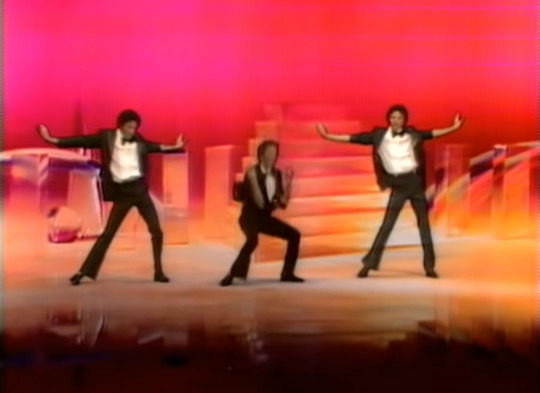
The other power shown here for the first time is Possession. Not only does Jackson summon multiple versions of himself here, but he also seems to command them to dance exactly as he does. The clones can’t possibly predict the steps he’s going to do ahead of time (even if they are him), so the only conclusion must be that Jackson uses mind control and possession in order to make his dancers do the right steps. Even in this first video, we can see the beginnings of a strange being tapping into his powers and learning how to use them. It makes sense when you consider Jackson was only twenty-one when making this video, which is generally accepted to be when the human mind reaches maturity. This video lays the groundwork for the rest of Jackson’s videography and allows for him to experiment further and turn music video creation into a bonafide art form.
Now that we’ve laid a foundation, it’s time to begin discussing these powers in-depth.
Superpower #1: Summoning
After learning to summon clones of himself in the “Don’t Stop” video, Jackson takes this concept and applies it to his other videos, using the same two methods as previously detailed. In videos after, he occasionally summons music through some sort of action. “The Way You Make Me Feel” has him sing the first lines before letting out the same “WOO!” that brought the music to “Don’t Stop”. “Bad” has him shoot his hand up, snap, music starts. “Smooth Criminal” has him famously flip a quarter into the jukebox from across the speakeasy, causing the music to start.
Most music videos of the 1980s had the music begin right as the video began. I mean, why not? That’s what we’re here for, right? Sure. But Jackson was different. In the world of his videos, the music doesn’t start until he commands it to. These videos all have one other thing in common: Jackson makes you wait for the song to start. The scene before the music begins usually involves the specific video’s characters at a standoff, with mostly silence as the only accompaniment. With this, Jackson allows himself to gain full control of his surroundings and put himself at the center of it all. Again, the music doesn’t start until he commands it. It’s one reason why his music videos became such an event. It wasn’t just that they were short films, he was creating a story, a world, and a specific reason for the music to be there. He made you wait for it. For example, “Bad”’s music video is a whopping eighteen minutes total in length; the song itself doesn’t begin until around the 9:40 mark.
But what is a music video without a little choreography? The only thing Michael Jackson was known for more than music was his incredible dance ability (...and being the subject of many rumors we can neither confirm nor deny.) Every music video the man ever made had dancing in it to some degree, with longer videos like “Thriller”, “Bad”, and “Remember the Time” having a specific part dedicated to complex and dazzling choreography that would win any contest in the Step Up or Bring It On films. This is where the second part of that summoning power comes in.
In some of these dance sequences, Jackson often summons multiple dancers that will proceed to join him and repeat the same steps that he does (which we’ll talk a little more about during the “Possession” section.) In the video for “Thriller”, Jackson famously has zombies rise from their graves and join him while famed gothic horror actor Vincent Price scares you with a monologue. In “Bad”, as soon as Jackson dons the same black clothes and various chains and shiny buckles that grace the Bad album cover, he has dancers of the gang variety fall into the shot and join him. In “The Way You Make Me Feel”, his street friends that are watching the king work his charms on an attractive woman join him for a dance sequence near the end of the video.
Granted, the logic of music videos dictates that asking questions like “How is this all happening?” or “Where do all those dancers come from?” are immediately refuted by the Mystery Science Theater 3000 answer, “It’s just a show, I should really just relax.” But where’s the fun in that? Being in full control of the worlds these music videos inhabit, Jackson clearly wills these dancers into existence, because who really wants to dance alone? Now, summoning is one thing, but how do these dancers and extras know how to do all of the same steps Jackson is doing? There can only be one answer...
Superpower #2: Possession
In addition to that, a quick, non-music video example provides us with an instance of Possession at work. The 1990 Sega Genesis game Michael Jackson’s Moonwalker contains a special move where Jackson takes as many enemies that are on screen and controls them, causing them to dance quick routines (usually recreating the iconic moves from “Thriller”) and then disappear from the screen. This move also costs a chunk of your health bar in order to use, which indicates that Jackson must be exerting some strange part of himself in order to make this happen. However, surely not as strange as the next power on our list...
When Jackson has these extra dancers with him, once he enters “Dancing Machine” mode, the others join him, all while repeating the same steps he does. During these segments, Jackson is always in the center of the shot, naturally, as he’s always the one leading. In the world these videos inhabit, how does he get these extra dancers to join him and do these moves so flawlessly?
Simple. He’s possessing them and causing them to perform these moves, whether they’re fully conscious of it or not.
I mean, as we talked about with the video for “Don’t Stop Til’ You Get Enough”, there’s no way those clones could have possibly known what Jackson was going to do ahead of time... unless something or someone was guiding them. Perhaps a leader who already knows all the steps... once again, the artist retains full control of everything happening in these videos.
There are five videos where Jackson does dance routines with several other people: “Thriller”, “Beat It”, “Bad”, “Smooth Criminal”, and “Remember the Time”. Of these, three of them (“Beat It”, “Smooth Criminal”, and “Remember the Time”) involve Jackson doing dances with people who are either summoned or already on screen. There is no verbal communication or look exchanged at all. Jackson just starts moving and whoever is around joins in, whether they be gangsters in “Smooth Criminal” or the people of the Egyptian kingdom in “Remember the Time”.
But the video for “Beat It” perhaps provides the best example of Possession at work, especially since this example does not involve Jackson summoning anyone, he instead goes to others. In “Beat It”, Jackson makes his way from a small room, to a diner, and then finally to the scene of two rival gangs at a standoff, switchblades out. After this quick standoff, Jackson comes between the two gang leaders and proceeds to start bustin’ them sick moves. Both gang leaders quickly join him and then the rest of the gang members. The rest of the video is dedicated to all members dancing, proving that the answer to ending any conflict is by simply having Michael Jackson come in and command both sides to dance.
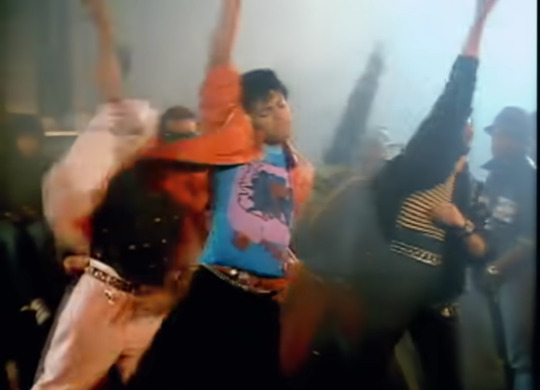
In addition to that, a quick, non-music video example provides us with an instance of Possession at work. The 1990 Sega Genesis game Michael Jackson’s Moonwalker contains a special move where Jackson takes as many enemies that are on screen and controls them, causing them to dance quick routines (usually recreating the iconic moves from “Thriller”) and then disappear from the screen. This move also costs a chunk of your health bar in order to use, which indicates that Jackson must be exerting some strange part of himself in order to make this happen. However, surely not as strange as the next power on our list...
Superpower #3: Transformation
The first instance of Jackson transforming from human into something different was “Thriller”, which he does twice in the video. The first instance is during the movie that he and his girlfriend are watching before the song starts. He goes from normal human to werewolf. The second instance comes right after Vincent Price’s monologue in the song, when Jackson’s girlfriend turns around in horror to find that she’s surrounded by zombies... and Jackson is now one of them. Naturally, this terrifies her. She runs away, only for the zombies to follow her and eventually corner her. Just before they go in for the kill, she wakes up, alerting the viewer that everything that has just happened has been just a dream... or was it? “Thriller” famously ends with Jackson and his girlfriend walking out of her house, but not before he takes one more look at the camera, once again sporting the werewolf eyes.
Transformation appeared in no less than four of Jackson’s music videos: “Thriller”, “Bad”, “Speed Demon”, and “Black or White”. Most of these videos saw him transforming into some sort of animal, as evidenced by “Speed Demon” (a Claymation rabbit), and “Black or White” (a panther).
This is the first of the powers that Jackson uses that reflects his actual life outside of his videos. Transforming from human into something different in his videos can be connected to his dislike and insecurities with his own appearance and the numerous plastic surgeries he had over the years. That’s even before bringing up the obvious fact that Jackson went from a dark-skinned black man in the late seventies to whiter-than-Mount-Rushmore-covered-in-sour-cream complexion time the early nineties rolled around.
The first instance of Jackson transforming from human into something different was “Thriller”, which he does twice in the video. The first instance is during the movie that he and his girlfriend are watching before the song starts. He goes from normal human to werewolf. The second instance comes right after Vincent Price’s monologue in the song, when Jackson’s girlfriend turns around in horror to find that she’s surrounded by zombies... and Jackson is now one of them. Naturally, this terrifies her. She runs away, only for the zombies to follow her and eventually corner her. Just before they go in for the kill, she wakes up, alerting the viewer that everything that has just happened has been just a dream... or was it? “Thriller” famously ends with Jackson and his girlfriend walking out of her house, but not before he takes one more look at the camera, once again sporting the werewolf eyes.
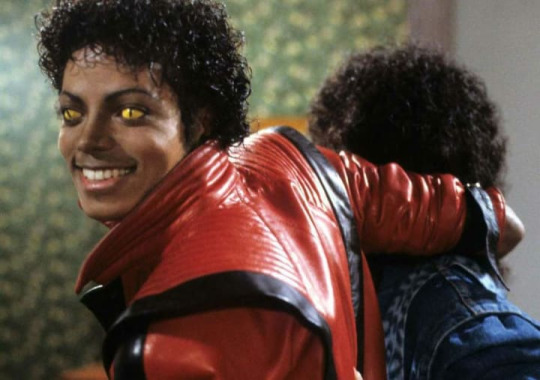
“Thriller” is the video where transformation shows up the most, next to “Black or White”, as Jackson shows he can change back and forth from human and zombie when needed. Once he turns into a zombie, he engages in the iconic dance sequence with his fellow zombies. Then, he’s suddenly human again in order to sing the chorus to the song, then turns back into a zombie to deliver more scares before the nightmare ends. This ends up proving one thing: The zombies aren’t the ones that change and zombify him. Jackson can shapeshift at will. I mean, he pretty much has to, otherwise he would look out of place dancing with them. In the creation of these music videos, every choice was a deliberate one and Jackson was smart enough to know that music videos, much like any type of film, doesn’t need to conform to reality.
Now, to add another example onto our pile, the video for “Speed Demon” begins with Jackson finding himself on a movie set (where everybody but him is played by Claymation figures for some reason) and running away from screaming fans who want a piece of the man (and perhaps an autograph.) You know, the usual stuff when you’re a huge mega-star. After a brief chase scene, Jackson finds himself inside a costume room and decides that a disguise is what he needs in order to slip out undetected. This of course is an obvious reference to Jackson’s own life: By the time the video was shot (1988) he often had to use disguises and masks in order to go anywhere without being mobbed by fans and admirers.
The disguise Jackson decides for “Speed Demon” is a motorcycle riding Claymation rabbit, the second time we’ve seen Jackson go from human to animal. It makes perfect sense for a song about riding fast and chasing the adrenaline rush that comes with riding at high speeds. After watching Jackson-as-rabbit ride through the mean streets of some unidentified city, he takes a rest at what looks like the same canyon area Wile-E-Coyote and Road Runner chase each other in. He spins around fast (a separate power we’ll discuss shortly) and becomes human again... then the rabbit returns and he has a dance off with it where we find the rabbit has his own playbook of sick moves, providing the world with the second greatest team-up between a man and a rabbit (Who Framed Roger Rabbit? still being number one, coming out a year before this video premiered as part of the film Michael Jackson’s Moonwalker.)
“Bad” is an interesting addition here, as it’s the only video that has a transformation of personality rather than an actual physical change. “Bad”’s music video tells the story of a young inner city youth named Darryl (played by Jackson himself) who is heading home after a term at a fictional prestigious high school (referred to as “Dustbury” and “Doomsbury” by Wesley Snipes’ character.) Once home, he begins clashing with his old friends after he shows discomfort with petty crime, with the friends believing that his going to school has turned him into a sissy who ain’t “bad” and “ain’t down with it”. All through the first half of the video, the cinematography is in black and white, with the transition to full color finally happening once Jackson appears in the same outfit he donned for the Bad album cover.
The entire song was meant to re-invent Jackson’s image from a meek little dancing machine with a high-pitched and soft voice, to an edgy, tough guy dressed in black, adorned with chains, and bad to the bone. All of this was meant to answer the big money question, “Who’s bad?” This was, of course, done in 1987, before Jackson had to spend most of the nineties and the aughts fighting heavy accusations of child sexual abuse and trying to convince people that he wasn’t bad at all.
Jackson showed the transformation power one more time in his music videos, which was 1991’s “Black or White”. In terms of the power being shown, Jackson doesn’t do it until close to the end. After the iconic sequence where other people sing the line “It’s black, it’s white” while seamlessly morphing/transitioning from one person to another person of a different race (an impressive visual effect for 1991.) The video “ends” with shots of the video set and everybody applauding and going for break. While this is happening, the camera cuts to a panther walking through the set undetected, heading for the downstairs area. Once downstairs, the panther morphs and reveals itself to be Michael himself. He then goes into a furious dance routine in a street setting and destroys a glass beer bottle, a building window, and a parked car labeled with incredibly racist words/phrases spray-painted on them. It’s worth noting that these messages are removed in most versions of the video widely available today, as the image below this paragraph will show. The video offered on Jackson’s official Youtube channel has the version with these racist phrases removed, meaning that the context for why he goes on this rampage and breaks stuff is also gone. Regardless, he tears off his shirt and screams with grand drama as the hotel neon sign falls. This is a very different kind of scene for Jackson, who rarely showed any kind of violence or anger in his videos. After his damage and rampage, he turns back into the panther, growls, and leaves the screen, bringing the video to a close.
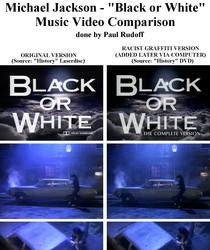
These different transformations not only add a new and exciting element to Jackson’s videos, but also give us a fantastical look at his desire to be somebody (or in these cases, something,) that wasn’t him. A conflicting contradiction where he both wants to be the star and not be the star at the same time. These instances of changing into something else doesn’t seem odd in hindsight, given that Jackson was someone who went through an entire lifetime of literally changing the “Man in the Mirror”, to the point where it’s almost impossible to imagine what he could’ve seen when he looked at himself in the mirror. This superpower is a case of wondering and asking if it’s art imitating life or life imitating art. But we still have two more powers to cover...
Superpower #4: Super Spinning
If there’s one thing Michael Jackson was good at doing, it was being able to spin around fast and stop on a dime without any trouble. He did it all the time; on stage, on video, probably alone in his house too. Spinning isn’t a power that shows up a ton of times in his videography, but it’s still something that he does that causes odd things to happen.
The strangest example of him doing this comes in the “Smooth Criminal” video. There is a quick instance where Jackson jumps onto a table, spins around for a few seconds, and then snaps loudly. This then causes a skylight to blow up. I can only assume that energy builds up inside of Jackson when he spins around, which he can then use in order to strike things or cause things to happen. In “Speed Demon”, when doing the dance off with the Claymation rabbit, Jackson blows his mind and wins by spinning around so fast that he creates an aura of light as well as illusions of the other Claymation characters featured in the video before stopping on the tips of his toes.
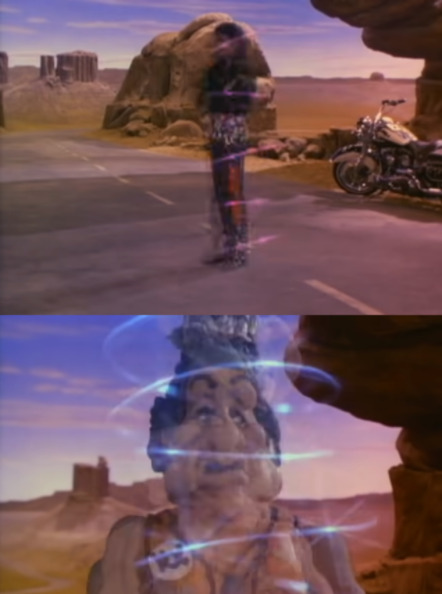
The final time Jackson’s spinning does something in a music video is in “Remember the Time”. At the end of the video, Jackson is being chased by the king’s (played by Eddie Murphy) guards after serenading the queen and finds himself cornered. Left with no other options, Jackson spins himself into dust, causing him to disappear (which is the last power we’ll be talking about shortly.)
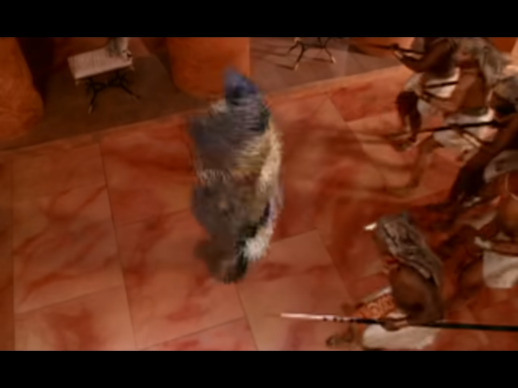
This is the most obvious use of superpowers since it was Jackson’s most well known move next to the moonwalk. It helped to add a special visual flair to videos and was a move that many young fans watching would probably want to try and imitate, especially if they found moonwalking too hard a task. (Personally I never wrapped my head, or feet, I guess, around how to do it...) It’s a cool move that made cool things happen. Sometimes, Jackson even used it in order to perform...
To return to the Moonwalker Genesis game again for a second, spinning is actually a special move Jackson can do in-game in order to defeat enemies. In fact, being able to spin around uninterrupted for a short period of time on-screen is what triggers Jackson to make enemies dance on screen (calling back to the power of Possession we discussed earlier.)
Superpower #5: Vanishing
Jackson has at least four videos where he performs the ability to vanish in thin air. The first video to showcase this ability was the video for “Billie Jean” in 1983. The video shows Jackson walking through a city street set. As he walks around he tosses a coin to a homeless person, takes a second to shine his shoes, and makes his way to an unnamed lover’s hotel room, with things lighting up and turning to gold while he does this. He is also being followed by a strange man in an overcoat in the video, obviously meant to represent a member of the paparazzi looking for an exclusive photo of Jackson that can be sold to tabloids. The vanishing act occurs when Jackson stops to shine his shoe and the paparazzo quickly flashes a photo. Hoping that he was successful and got a good shot of him, he looks at the photo to see that Jackson isn’t there. He has completely disappeared without a trace. This means either one of two things: 1) Jackson is a vampire (...could’ve been for all we know.) 2) He has the power to vanish before our very eyes.

He does it one more time in “Billie Jean”, near the end of the video. As he makes his way up the stairs of a motel, the paparazzo is slowly tailing him, still hoping to get a photo of the elusive artist. Jackson makes his way to a bed with an unknown woman sleeping in it. As the paparazzo gets ready to snap his photo, Jackson enters the bed (which proceeds to light up, same as everything else he’s touched.) However, as soon as Jackson is in the bed, he vanishes again, leaving an empty bed and a paparazzo who has just taken a photo of an unknown woman sleeping. He is taken away by police officers as the video plays back in reverse, with everything Jackson lit up previously disappearing.

We’ve already seen Michael spin himself into dust and vanishing in “Remember the Time”, so the only other example to name is in the video for “The Way You Make Me Feel”. The video takes place on a city street at night. Jackson is hanging out with some of his homies (as one does) while they ogle at an attractive woman in a little black dress walking by. Jackson calls out to her, she stops, and Jackson slowly makes his way over to her. His friends wait in anticipation to see if the king’s charms will get the woman on his side. He proceeds to start singing the line, “You knock me off of my feet now, baby” and summons the music, busting out a few moves in the process.
The vanishing act appears close to the end of the video. Jackson and his friends are seen doing a silhouetted synchronized dance in the street, you know, as we all do with our homies. The camera goes from the dancing set to showing the woman again, then pans back to reveal that Jackson has disappeared. His friends can be seen leaving the screen to the left and are hanging out on the edges of an alley, but Jackson is gone without a trace. He reappears at the very end and hugs the woman, ending the video.

Honestly, why he disappears only to reappear again is anybody’s guess. To give the end of the video an extra punch maybe? I don’t have a real answer for that one. But what I can say is that wanting the power to vanish whenever you want and be seen as an almost mythical creature is definitely a power Jackson would’ve found useful and probably wanted for most of his life. When you’re the biggest celebrity on the planet and everybody worships you and wants a piece of you, being able to simply vanish on the fly seems like a pretty attractive thing. Not to mention Jackson’s numerous controversies and bizarre behavior throughout the late eighties, the nineties, and even the aughts. A list that includes owning numerous odd animals (a monkey named Bubbles and a llama, in particular), building an entire small amusement park in his backyard, accusations of child molestation, and, lest we forget, dangling his infant son over a hotel balcony. Couple that with a dozen other rumors that tabloids may have made up and anybody in that position would want to be able to vanish without a trace.
So, we’ve covered all five of the man’s superpowers. That must mean we’re done, right? Not quite. There’s one more thing we have to cover...
Is It Scary?: Superpowers and Michael Jackson’s Ghosts
It’s October 1996, three years after Michael Jackson underwent his first round of child sexual abuse allegations as dentist Dr. Evan Chandler accused Jackson of “repeatedly committ[ing] sexual battery” against his then thirteen year old son, Jordan.
In case a recap is needed, here it is: On August 24th, 1993, as the third leg of Jackson's Dangerous World Tour was getting started, news of these allegations broke to the public and in turn received worldwide media attention and coverage. As a result, Jackson canceled the remainder of the tour, citing health problems arising from the scandal. In January 1994, Jackson reached a financial settlement for $23 million with the Chandlers. In September of that year, the criminal investigation was closed after the Chandlers declined to cooperate, leaving the case without its main witness...
But the damage to Jackson’s reputation had already been done. It didn’t help that this wasn’t the first time the public had to be told about Jackson’s weird behavior, which, by 1993, had become excessively strange for reasons that have been mentioned previously. Several endorsements were lost and plans scrapped, such as PepsiCo dropping him after a nine year partnership, a recording of an HBO concert special, and is supposedly the reason why Jackson left during the making of the music for Sonic the Hedgehog 3 (though there are conflicting sources citing different reasons as to why he left that project.) Regardless, the damage was done and as the nineties went on, Jackson only became more of a social pariah, with the 1995 album HIStory: Past, Present, and Future, Book I, having several songs related to and directly reference his battles with these allegations.
Which brings us to Michael Jackson’s Ghosts. A 1996 short film with a story written by Jackson, Stephen King, and Mick Garris. The film’s storyline is simple. It opens in the town of Normal Valley, where the mayor (played by Jackson himself) is leading a mob of local parents to the mansion of a man known only as The Maestro (also played by Jackson), who has been entertaining local children with magic tricks and ghost stories. The children assure the parents of the mob that the Maestro has done nothing wrong, but the mayor intends to banish him, believing him to be nothing more than a "freak".
Once inside the mansion, the maestro appears and challenges the mayor to a "scaring contest": the first one to become scared must leave and never return. He proceeds to perform magic tricks, does dance routines with a ghostly horde, and possesses the mayor, forcing him to dance. After the extravagant performance doesn't win him the contest, the maestro agrees to leave and crumbles to dust, only to return as an enormous demon when the mayor and the mob proceed to leave. The mayor, who is now terrified, leaps through the window, supposedly running away. The families all agree that they had fun and they allow the maestro to stay.
None of this is even remotely subtle and having even the most basic background knowledge of what was going on in Jackson’s life around this time would tell you which parts of the film are meant to represent things in real life. Despite all of this, the film does something that none of Jackson’s videos have ever done: make the use of superpowers look horrifying.
Before this film, Jackson’s use of superpowers in his videos were usually nothing more than light-hearted parlor tricks; feats meant to entertain and captivate an audience watching him on television. But here, every single power that’s been discussed previously is represented, but instead used to scare the audience. This is obviously intentional, as it plays up the public perception that Jackson was a freak of nature to a fantastical degree. It’s also the only way in 1996 that Jackson could have really said anything (besides the music found on HIStory) that gave any real insight into how he viewed the allegations that caused irreparable damage to his career. Ghosts basically has Jackson saying, “They want to see a freak? Fine. I’ll show them a freak.” Besides, in a music video, you can’t be interrupted by interviewers looking for a sensational headline or quote.
Two powers appear in this film that don’t deviate too much from what we’ve already seen. He still vanishes and he still summons the music and his crew of dancers (this time of the ghost variety.) The other three powers shown here, all with Jackson performing them with creepier connotations.
For starters, he transforms several times in this film. The first instance is when he stretches his skin and then removes it to fully reveal his own skull. He takes this a step further by later shedding his skin completely to dance as a (CGI) skeleton. The other instance of Transformation that’s shown is when he decides to honor the rules of the contest and leave the mansion. How does he do this? He turns himself into stone and smashes himself into dust. He’s turned into creepy things before, like a zombie and a werewolf in “Thriller”, but those were meant to be more Hammer horror fun ones. This time the maestro wants to actually scare you. It makes sense, given that Jackson’s career by this time was the lowest it had ever been. This wasn’t a superstar utilizing wild effects to astound you, this was an angry, disgraced man trying to freak you out and turn himself into exactly what the public and media saw him as.
The idea of Possession, as we’ve discussed previously, usually involves Jackson telepathically getting dancers and other people involved in whatever dance routine is on his mind. That trick is still here in the form of Jackson’s ghost dancers doing what he does, but this power also takes on a more grim use here. In an attempt to scare the mayor of Normal Valley, Jackson literally possesses the mayor by flying into his mouth, making him dance in front of his mob. There are a few shots where you can see an outline of him crawling around in his stomach. This is the only time Jackson has ever presented this power in a literal sense and it’s creepy and weird as hell. Every other time it was simply implied and just used as a fun way to get background characters like gangsters, street guys, and Egyptian guards to dance with him. This instance in Ghosts just removes all the light-hearted fun and makes it deadly.
The final power that has a different interpretation is Jackson’s super spinning. Normally, Jackson uses it in order to build up energy or create some kind of illusion. Here, it’s combined with Transformation in order to make him into something deadlier than how he usually appears. Here, Jackson spins in order to reform his skin when he’s done being a skeleton, but instead of turning back into his usual self, he returns as a giant with a grotesque face that looks only slightly less horrifying than the zombie face from “Thriller”, which may or may not have been a way of representing the media and public’s prattling and prodding of Jackson’s history with cosmetic surgery.
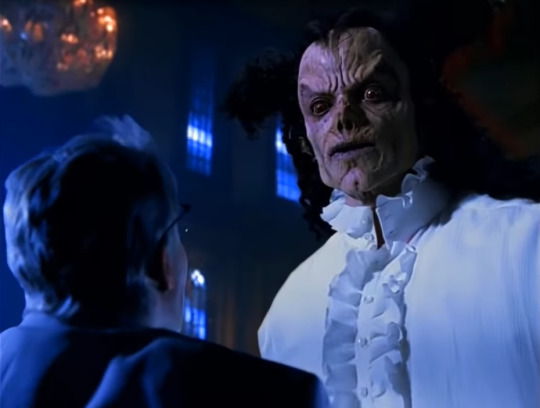
Overall, Ghosts isn’t just turning light-hearted fun into something macabre just for the sake of making an elaborate Halloween-themed music video, it’s an artist attempting to change a narrative that’s been placed on him... and it doesn’t work. As said previously, the damage was already done and making a video with an unbelievable story like this wasn’t really going to change the minds of people who already came to their conclusions. Jackson using horrifying powers to mess with a town mayor and get the townspeople on his side could only ever exist in a video like this; it can only exist in a world where the creator and storyteller remains in control of the narrative.
Conclusion: Creating Magic
For Michael Jackson, the bigger and crazier that things got in his life, the more difficult it was to keep control. When you reach the top, there’s only one way to go: down. The use of superpowers shown in his music videos start out as harmless fun, but eventually reveal themselves to be magical ways of escaping the real world and giving one the chance to live out fantasies that can only be dreamed about. We all sometimes wish we could just disappear on a whim. We all sometimes wish we could morph into something or someone different. We all sometimes wish we could be the center of attention. These wishes aren’t harmful, they’re normal fantasies. One of the reasons many fans constantly return to these music videos and remain such cultural touchstones---even in a present time where Jackson is more controversial than ever before---is because they inhabit a magical world where suspension of disbelief takes over and for just a few minutes you’re in a world where anything could happen. You can clone yourself, you can get others to dance with you without fear of embarrassment, you can spin yourself into dust, you can vanish, you can become a zombie or a werewolf or a panther or whatever you’d like. The possibilities remain endless.
But perhaps it’s worth it to let the man himself explain it. In an unauthorized interview done at Jackson’s home in the winter of 1983, he says, “I like creating magic”. He then gets asked what his idea of “magic” is. His response:
“When I explain ‘magic’ I mean wonderment, excitement, the unexpected, escapism, creating something that is so incredible. An illusion. To put people in a situation, no matter what it may be and give them totally the opposite or the unexpected, so much more than what they thought would happen. I mean, just blow their minds. I like creating magic, excellence. I love doing that. There’s nothing like it. I try to do it in everything I do.”
He succeeded. Much of the man’s life story remains shrouded in speculation, but the body of work that still stands is not. The intentions couldn’t be any clearer. The man set out to make something that nobody had ever seen; that nobody thought was possible before with music video. The darkest parts of his story will always be discussed, debated, and dissected. The lightest parts will always be these videos, these moments in time that defined a culture and not only helped turn MTV into an empire but also turned music video into a legitimate art form. For Michael Jackson, his creative use of on-screen abilities, visuals, and everything else in between, all came together harmoniously in order to shape the world he brought to life through his work. It was always meant to serve one purpose: To create magic.
#original content#michael jackson#music video#mtv#1980s#off the wall#thriller#bad#music essay#music criticism
3 notes
·
View notes
Text
Cat rich and lonely
So I made a pact with a special someone to write every day for a month. Very few constraints or expectations, really. And nothing on my calendar the first day of the pact. And yet here it is, after 9 pm on day one, and I haven’t written a thing and all I want to do is flop down in bed and sleep until it’s another day. I could write about the 3 hour walk I took today, and the 3 cats who graced me with their presence all at once (truly a Tacoma-flavored treat, especially underneath the April cherry blossoms, as it was). That would be easy. There was the brown-black-white floofy pregnant mama cat whom I named Snickers, and her beau the tuxedo cat, dubbed here Mr. Bigglesworth. They clearly had some jive to jive with each other, and Snickers was a jealous lover, ambling over immediately as soon as attention shifted to Mr. Big (or, god forbid, the third cat, a polydactyl orange number who was suspicious enough of these two’s affair to stay at a respectful distance, miss out though he might on pets).
That would be easy. But what’s actually been on my mind today, and is not easy, is my dad. His birthday is tomorrow. He would have been 68 years old. Instead, he is barely 3 months dead, killed by a cancer about which he would talk to nobody. He died alone in a hospital room. I was on my way to say goodbye but did not make it in time. Initially that felt like a true personal failure - how could I have not seen the signs, read the writing on the wall and heard the nervous calls from my sister more clearly, earlier, in time? And yet when I voiced despair at my dad not even knowing I was on the way to see him at the end, let alone actually saying goodbye, my sister suggested that he probably wanted it that way. Wanted to pass away alone, without burdening others too much, without interrupting anybody’s day. At the time, I accepted this as true, mostly because it was an easier way to smooth that emotional path in the short term. In hindsight though, my easy acceptance of that is hard to swallow because it shines a light on two very relevant things: 1) my father was extraordinarily lonely and 2) I knew it. Not only did I know it, I somehow managed to morph it into something I could not assist with. Because I got “too bored” when I would try and talk to him and all he wanted to talk about now was the latest construction on the new Meow Wolf they were putting up in Denver, or the most current reason the train to the airport was having troubles. I was regularly irritated by these seemingly mundane attempts at conversation, so much so that I spent a lot of time actively avoiding talking to him (and stressing about the fact that I was actively avoiding talking to him). The heavy benefit of hindsight as well as my own current confrontation with loneliness and isolation brings a clearer vision (or admission?) that it wasn’t that my dad didn’t have the capacity for deeper or more meaningful conversation, or that he didn’t want it - it’s that he had so little of ANY type of conversation or human interaction that it was likely hard to jump into the deep end of that, even at the rare times it may present itself, even if it’s something you maybe want, deep down. If you go days and days (weeks?) without speaking to anyone, you’ll probably be hard pressed to hop on the phone and immediately spill your deepest fears about dying, ask for help with navigating medical bills, or admit to the pain you’re in physically.
I was on the phone with my best friend the other evening (one of the very few people I ever call out of the blue), and it was about to be dinner time in Denver (her locale). Our conversation, therefore, consisted at least 60% of me listening to her talking to her son about what he could and could not snack on, interfacing with her partner about how to replace a vacuum filter, while the crashes and bangs of her preparing dinner created a cacophony in the background all the while. One could not call it a deep conversation. We uncovered no truths about the universe and honestly not much we spoke of was of much more “true interest” than the construction of Meow Wolf. In fact much of it wasn’t even conversation, but just being. Being together, as much as we could, while very far apart. It’s what I needed. It’s what she needed. It’s how we likely would have been interacting if I had been there physically. The real-life setting of actual human interaction isn’t linear, it’s not line-by-line dialogue, and it doesn’t exist only to isolate and solve the deepest quandaries of our existence. Instead, it’s messy and loud, it’s not about anything in particular, and it’s also about everything at once. Being with people. Knowing and hearing people. Being known and heard. Heard, even if what you want (are able) to talk about is the train to DIA.
I am learning, over and over again, how much those little interactions can matter. In dark moments I can feel myself pull away from them, hear the voices in my head that tell me I’m only worth interacting with if I can come with a joke, buoyant energy, and an astute observation about the world. When I turn back to those moments and allow them to hold me, even briefly, in their subtle way, I am somehow surprised every time that I feel better. More human. Problems not solved, complications not banished, but human.
I’m under no delusion that I could have or should have solved my father’s isolation and loneliness. Nor can I reasonably claim to actually understand his total experience. I can, however, deeply relate to some of what I believe him to have confronted (and there is a whole novel to be written about parallel or mirrored paths in this realm, but that’s for another day). I also know that the experience of aloneness or the becoming thereof is not such an abstract and distant concept that it is totally out of one’s control. One makes choices every day about what to prioritize, and how. I want to believe that choosing to bend to the pull towards isolation on any given day is just that - a choice. It certainly doesn’t always feel that way, but I aim to remember that I can instead choose to talk to someone about any little thing, and remember that such conversations matter. That they feel good. And that damn do I wish I could talk to my dad about railroad tracks again.
1 note
·
View note
Note
😮 Oh man, with the insight on Frank, it has me so curious. What's going on in the heads of everyone in the Legion lately? I'm especially curious about Joey, after the quality time spent with the survivors (well, in the back seat with Susie driving) during "She's Like the Wind". Or, if you're tired of the Legion, what about Michael in "The Tower"?
I’m totally happy to do the Legion (and I actually wrote up a bunch of stuff on them before deciding p best to wait), but there’s a lot of Legion stuff in the chapter I’m posting in the next couple days with some sort of big status-quo changes, so I feel like I should wait until after that to give Legion updates, or it could be kind of a waste, so I’ll do Michael.
Oh boy Mikey. Let me see. Buckle up, because this is a long one. So, let me start by saying in this fic, the way I write him is based on the canon portrayal in the first film (and some influence from the others—especially 2 and H20), but with my honest best attempt at an accurate psychological take on his situation. Horror’s a great genre, but it does a really shitty job about using mental illness as some kind of blanket excuse for being evil. John Carpenter literally came up with Michael after seeing some 12 year old schizophrenic kid in a mental institution when he was on a field trip that he thought had really dead, evil looking eyes, like he didn’t have a soul. Which is a pretty fucked up way to treat mental illness. And, since there’s no reason I should accept ‘He’s got psychosis and the devil’s eyes and has nothing in him but evil” as an accurate take on an actual human being, I’m not. I’m taking what is canon, and interpreting it (to the best of my ability) like a normal psychologist or person who isn’t Dr. Sam Loomis would. Usually I wouldn’t give as much on a character psych take (because I really, really like seeing how people interpret things), but it’s kind of specifically important for Michael and me doing my best to write him responsibly that while he’s a lot of things, and a lot of them bad, he’s not a mindless wall of walking evil.
Canonically, Michael’s had psychosis since he was at least five, and heard voices that told him to do bad things, like hurt people. He told his parents, in an attempt to get help, and was ignored. When he was six, he did what the voices told him to in an attempt to get them to stop, and killed his sister (without looking at what he was doing while he did it as much as he could [canon]), and then went downstairs to wait for his parents to get home (probably in the hopes that they could fix it, because he was six years old, and when you’re six, your parents can fix everything). Instead of anything getting better, he got sent to court, sentenced (to be tried for murder as an adult in fifteen years when he turned 21, which is absolute bullshit because by no stretch of human logic can a 6 year old child have committed a crime as an adult), and then left in an asylum for the next fifteen years of his life. His psychosis worsened, and he gained other symptoms, such as mutism and catatonia. His mom only visited a few times, with his little sister, and then she vanished off the face of the planet from his point of view. Completely abandoned by his family and everyone he knew, the only human contact he had from ages 6-21 was Doctor Sam Loomis, his psychiatrist, who had decided within a couple of months, that Michael was the human personification of evil, faking his mental illness like the evil genius six year old he was, and a demon in human form hellbent on murder. Now, the human brain doesn’t stop developing until the mid 20s, and it sure as hell isn’t done when you’re six. Kids that age don’t even really have a fully developed understanding of mortality and only a basic grasp on ethics. Emotional empathy doesn’t start really forming well until age seven, and abstract reasoning isn’t until preteen years. When you’re six, you’re not old enough to be evil. You just aren’t. But, if you grow up from age 6-21 with only one constant in your life, isolated in a tiny white room, hearing over and over from said only constant, an adult and the source of authority in your life, that you are evil, and soulless, and you are a killer waiting to kill again, you are dying to get out and commit murder, and they’re onto you, how exactly can you expect a human being to turn out?Especially when they’re already dealing with violent psychosis. You’ve basically convinced a mentally ill child that they are the bad voices in their head, not the person, and their goal in life is to commit lots of murder.
Michael’s personal goal, as much as he has one left, has pretty much solidly always been to do what the voices want so they’ll stop and he can be at peace. What they want is for him to kill his family, meaning his sister, Laurie. Kill Laurie, be at peace. That being the case, ending up in the Entity’s realm is about as shitty for him as it is for her, because no matter how many goddamn times he kills her, he can never, ever kill her for real, so he will never be able to stop the voices. He’s about as tired of being here as she is, which is saying a lot. But it’s been forty years of shit for him too.
I think Michael forgot he was a person a long time ago, because nobody’s treated him like one since he was baby. Since he was six. If you treat someone like a monster their whole life, that’s what they’re almost certainly going to become. In the Entity’s realm, it hasn’t really been any different. I don’t think he thinks about things very complexly, because he’s sort of too tired to, and he doesn’t have a real reason. He never learned a lot of normal human behaviors, including any attempt at even the most basic social contact. It’s like that really depressing scene in Lilo & Stitch when Jumba’s commenting on what it must be like to have nothing, even memories, to visit at night. He has memories, but they’re basically all the same—white room, fifteen years of Dr. Loomis. None of that’s a real human experience. Dr. Loomis didn’t even think he was a human—called him “It” instead of “Him.”
With Laurie suddenly acknowledging he’s her brother, it’s weird to him. Canonically, every time someone in a film reminds Michael he’s related to them, it’s like he gets smacked in the face (it’s actually kind of hilarious. He even takes his mask off for his niece in 5 when she calls him “Uncle”). A family member doing this always metaphorically suckerpunches him with the reminder that he has a name and an existence outside of killing people and there are human beings who know who he is and are related to him and have a lasting concept of him as a person. It’s not like he ever forgot they were siblings, but he didn’t remember to think about it. He spends all his time being the Shape, because Michael hasn’t really existed since he was six years old (not in a Dissociative Identity Disorder way, just, it’s an aspect of who he is that no one has been willing to acknowledge since he was a baby. He puts on the mask and kills because that’s what he’s supposed to be. It doesn’t really matter if he wants to, or if he likes it, or even if he still doesn’t have a completely developed concept of mortality, because he’s known for years now that it’s just what he does. It’s what he is). I don’t think he really knows how to think or feel (which he’s not used to doing period) about his sister or about that and being spoken to. He was definitely relieved at the prospect of having a way out of this, and since then it’s been kind of agonizing that she reneged on him and won’t commit joint suicide, but she’s also just been…weird. Been different. She talks to him like a person, which no one has ever done, and he does remember her from when they were little. I think it’s very confusing. He really doesn’t have the normal human skillset to be able to emotionally understand this. Which doesn’t mean he’s some emotionless zombie, just, he didn’t learn how to properly interpret or respond to things. He doesn’t have a normal human emotional or social skillset, because he never got to develop one. He didn’t get the chance. He hasn’t had a positive physical interaction, a hug, a handhold, a pat on the shoulder, since he was six--he hasn’t had any kind of social contact outside of the hostile psychological hatred and threats from Dr. Loomis period. There’s just not a normal set of human understand-the-world mental structures developed in him at all. Instead he’s got like…just all this shit—this really fucked up way of understanding the world built from fifteen years in isolation with just Dr. Loomis that’s completely separate from a normal human experience or mental scape, and the mental set of tools he would use to try to understand his sister is like, the dusty old normal human set that stopped growing when he was six years old that he kind of forgot about.
Michael’s also never done anything he wasn’t supposed to in the Entity’s realm, and I don’t think this has been explicitly stated in the fic, but he’s been punished now, for trying to break the rules with Laurie these past few trials. I don’t think he knew how to handle that or feel about it or think about it either, because it was a new experience for him. It’s very hard to hurt him at all, and it’s never happened with the Entity before this.
During The Tower, Michael wanted what he’s wanted since it was on the table (a way out by killing her), and when she said she couldn’t do it yet, genuinely misinterpreted that as her meaning she had to help the others finish the trial first. I don’t think he entirely understood why she kept running away from him, but he’s used to that kind of behavior, so it wasn’t that strange. What was extremely weird to him was getting jumped by two kids (when usually survivors wouldn’t touch him with a fifty-foot pole if it was up to them), who proceeded to tell him be was being a really crappy brother and should be nicer. It was. Surreal. I think when Laurie showed up and told him she hadn’t meant ‘in twelve minutes’ when she said later, he didn’t just attack her because he was mad she didn’t want to do suicide yet, I think it also kind of hurt his feelings that she made fun of him when he genuinely was trying to understand and thought she meant something else. Since what he wanted was off the table, he was upset (which was especially volatile becaus he doesn’t often experience hugely strong emotions) and on instinct just did what has been programmed to come naturally instead and went fucking lethal on them all, but got a surprising amount of resistance.
When she came back to fight him alone, I don’t think he completely understood everything she said, but he got a lot of it, and he didn’t like it. He didn’t like losing the chance to get out of the realm for good with her, but I think he also didn’t really like being basically told that he was dead to her from here on out. I don’t think he’d exactly think of it that way, or put it into words—I don’t think he’d had long enough or the emotional growth enough to appreciate her caring about him, or to want it, but at the same time, he’d had someone treat him like a person for the first time in fifty some years, and I think it was probably briefly nice to be called by his own name and talked to like a person—I think it would be hard for that not to mean a little bit, even if you didn’t understand way. And then he had it reaffirmed by her before their fight that what Dr. Loomis had always said was true, and he’d fucked up so bad with her that he wasn’t ‘Michael’ anymore to her either, and even if he wouldn’t really think of it like that, I think subconsciously, that kind of had to hurt.
At the end of their fight, when he was out on the floor, and Laurie didn’t kill him, while he was genuinely unconscious for some of that, he was awake for some of it too—the bulk of it, actually. Michael in film canon routinely not only has genuine resets where he passes out and heals and gets back up, but plays dead as well, to protect himself. So, he did hear a decent chunk of what Laurie said to him. She kind of poured her heart out, and some of it was pretty complicated stuff, and a lot of it was stuff he doesn’t really have the emotional complexity developed to understand right now, but he understood some of it. I don’t think he expected things to end like they did (and not just him getting his ass kicked by her). She basically flipped on him, and said she was wrong, and even like this he was still her brother, and because she remembers how he was when he was six she can’t make herself not love him, even if she knows she shouldn’t, and that she wasn’t going to kill him like that, even if it meant he was going to come after her again and kill her. I don’t think he gets why she would say those things, but it did make him want to know, and I think he’s aware that it should mean something to him, regardless of if it does or not on an emotional level, and it is at least something that interests him. Probably his most intact human emotion is curiosity (and it’s no wonder—he’s basically never seen anything, or been anywhere, or done anything—he’s barely gotten a chance to live, period. Any social interaction where someone isn’t running from him screaming or threatening him and telling him he’s a monster is uncharted territory). What that would mean for him going forward as far as Laurie is concerned is very complicated, though. Laurie interests him and there are things he wants to understand, but he’s just got so little ability to function like a normal human being. So much of him is so awfully mangled and maladapted, and the rest has been stagnating since he was 6 and he’s so very, completely, depressingly isolated. He’s a serial killer, but he’s really also kind of a tragic character. It’s fucked up what happened to him, and most of it isn’t really his fault. It didn’t have to be like that.
#In Living Memory#In Living Memory (fic)#Michael Myers#Ask#Long Post#(Super long I'm so sorry ToT)#dead by daylight#He held his hand out because he was curious and thought she might come back
13 notes
·
View notes
Note
What about 6, 7, 8, 9 and ten for Komahina?
6. Least favorite canon moment of them?
This isn’t really a moment so much as a mechanic but I really don’t like how Komaeda’s free time events are locked off if you don’t talk to him once on day one in chapter one. I understand that yeah Hinata wouldn’t want to spend time with him, but I think it really gets in the way with the idea they keep trying to emphasize of Hinata wanting to understand him. Like chapter 5 comes along and Monokuma is like “wow you really understand Komaeda-kun” and Hinata’s like “I really don’t shut up” because Hinata doesn’t feel like he does. But it’s hard to really feel like he put in much of an effort in canon as it is, and having those events be not available if you just don’t do it in that. It gets in the way of the message being sent and it really was just like avoidable by just NOT having that be a mechanic.
Also it’s just fucking stupid as hell to lock Komaeda off after chapter 1 because what about all the people who decided they cared about Komaeda’s life AFTER chapter one’s reveal like. it’s dumb kodaka. it’s a stupid mechanic.
7. Favorite headcanon trope/idea? (Your own or someone else’s)
I really like komahina fics where it takes Hinata 10000000 years to realize he’s bi and he’s having gay feels. I don’t really like it when it plays into the fujo trope of Komaeda being like his exception and he’s never had gay feelings before, and some internalized homophobia or some shit, yadda yadda, but I like when Hinata is just exceptionally emotionally oblivious because it makes my day when he figures it out.
Ideally what happens is Hinata realizes not only he has a crush on Komaeda, but he’s had like several other gay crushes before, and like even some het crushes he just missed because they were more low key than he expected of them, and just goes “wow I’m a dipshit” and I, the reader, cry, because he’s so oblivious but I love him.
I actually. When I used to run an ask blog. Because I’m a sap and also this is the best idea I ever had. I had Hinata’s very first crush be on Komaeda. Who he met when they were kids for a very brief period where they never quite got each other’s names, and Komaeda’s hair was its natural, not white color, and it was gonna take him a bit to realize that too but I didn’t get that far. Komaeda doesn’t remember this at all because his life is too much of a trainwreck. if i ever wrote a komahina slow burn this would happen for real. i’m too much of a sucker.
8. Least favorite headcanon trope/idea?
I mean besides all the weird fujoshi fan favourites, like the ones I just talked about, or yandere Komaeda, etc…can we fuckin stop with the “chapter 3 but Hinata realizes that Komaeda is actually being gay and confessing his love for him” fics because like we have 20000 of those are we not bored yet. did we not beat that trope into the ground. it was fun for a while but now its just exhausting.
9. Favorite aspect of them/their relationship dynamics?
all of it. AAALLL OF IT. I wrote like an entire post about why Komahina is great actually I’m just gonna link that shit right here and move tf on. It’s good kids. komahina is good.
10. Least favorite aspect of them/their relationship dynamics? (Can be headcanon)
The part where Komaeda dies and his arc and their relationship is never capitalized on in canon in a meaningful way. This is the long part but it’s also the best part of the whole post so under the cut:
Okay to be clear, I don’t mean I wanted sdr2 to end with a big damn kiss or whatever, that’s not fitting at all. I just feel like killing off Komaeda absolutely destroyed his character arc but also the dynamic and thematic exploration that was going on up until that point. Like chapter 5 is a brilliant chapter and it makes sense for Komaeda to do that but it’s also a god damn waste.
See, what was really great about their dynamic, was how Komaeda constantly challenged Hinata’s perspective of hope and himself by almost being a more extreme version of him. Komaeda is so fundamentally warped by the concept of talent and hope, that Hinata in an attempt to distance himself from that is forced to reevaluate himself. In chapter four Komaeda tells Hinata “you aint got no talent” which just crushes everything Hinata had his hopes banked on, but…it’d be better if that happened to Komaeda too.
Maybe you think “but Skylar Komaeda was crushed he learned they were all despair” to which I say “that’s not enough and it doesn’t change him or his perspective on the world.” Komaeda learning they’re all despair just fuels him into pulling off his most elaborate greater hope gambit yet which he wins fuck you fight me. It doesn’t change his worldview, not like chapter 4 does with Hinata. He just doubles down. Chapter four, in essence, is the heroes low point, and one where the view of the antagonist seems to have been bolstered.
….And then it stays like that. Komaeda’s idealogy is never effectively challenged. Komaeda dies believing he is correct, doing the same shit he’s been doing from the start, and chapter 6 doesn’t really call him on that. This is actually like a really big problem with dangan ronpa in that they set up an in-group antagonist who they then never really finish up that resolution in a meaningful way for the conflict. Sure in chapter 6 Hinata is like “FUCK THAT HOPE OR DESPAIR, FUTURE!” which kind of addresses it, y’know hope was Komaeda’s whole thing and it’s being rejected, but Komaeda’s idea that hope comes from despair is not proven wrong, and that the greater the suffering the greater the happiness. Hell, you could argue that because of the ending, where the characters learn the worst about themselves and overcome that to become their best selves and be happy, Komaeda was only proven correct. Komaeda dies believing he is right, and then the narrative indirectly confirms he is right. It’s uh…it’s not good.
But…y’know what would be better, and more interesting? If Komaeda lived. Say his chapter 5 gambit just…failed. Like Kuzuryuu or Hinata or someone finds him while he’s tying himself up in the warehouse and the fuckin domino panels don’t completely fall over because sometimes dominoes are like that. Or maybe they do but Kuzuryuu or whoever doesn’t get to throw that one grenade before the sprinklers go off. It doesn’t matter. What matters is Komaeda lives. And he’s confronted.
It’s important Komaeda fails this because this is what will crush his entire understanding of the world. Komaeda’s luck cycle isn’t real, it’s a coping mechanism. (His luck is real it just doesn’t work the way he thinks it does, all it does it make things that are super unlikely for most people extremely likely for him). Komaeda believes greater hope comes from great despair because that’s how he thinks his luck works. His luck makes him miserable, and then gives him something really awesome to counter it! What his luck gives him is never actually enough to justify his suffering, but he has to believe it does. This is Komaeda’s ultimate gambit for his worldview, the greatest feat he thinks he can pull to create the greatest hope from the worst despair, and…it fails. It fails, and he lives, thus also not grating his really obvious death wish. Komaeda, having banked his whole worldview and every wish on his luck, failed. It didn’t work. He was wrong. Where does he go from here?
Not only that but Komaeda’s talent failing him to such a massive degree would showcase to Hinata truly how little talent would actually save him or make him better. Komaeda banked everything on his talent and he was ruined by it, and maybe Hinata can find that happiness he was looking for elsewhere. Maybe there are other reasons he can be important. Maybe talent isn’t the only thing that matters. This is much more satisfying than Nanami just being like “hey hinata stop bein a lil bitch and love yourself already” in chapter 6.
So chapter 5 has our hero on the recovery path, and Komaeda in a state of like existential despair. But…here’s the thing about Komaeda. He can recover too. Komaeda, like all of them, is not hopeless. He doesn’t have to be ruled by his despair, which is a big thing about chapter 6. Chapter 6 is a lot of going “yeah fuck that we were horrible and shit and we’re gonna own it but we’re not gonna let it define and ruin us. We’re gonna move past it, and be better.” And that…boy does Komaeda need that.
Komaeda’s whole life was defined by his luck effectively making him miserable. Unlikely horrible things keep happening to him and he get poor compensation prizes occasionally, and he’s given up. He wants to die. Sure he talks a lot about finding the greater hope, but his actions convey that deep down, that greater hope to him, despite everything he says, is death. And now he’s no longer convinced of the worldview he’s been selling himself, and he’s left with nothing but his own despair. Something he doesn’t think he can move past.
Can you imagine how powerful chapter 6 would be if Hinata wasn’t arguing with Enoshima over the value of their future, but was actually trying to convince Komaeda of it? Enoshima thinks she’s got this in the bag because there’s no way the miserable Nagito will ever fuckin agree to the shut down when he’s given up on everything, and Hinata says no. No, they don’t have to give up. There is more than their pasts, and their talents, and the vague concept of hope, there is still the future, and for that alone it’s worth trying. It’s enough to live and move forward for the sake of living and moving forward and being better than you are, even if it seems hopeless.
Hinata realizes that they’ve all been focused on the wrong things. That it’s not about hope, or despair, or talent, or banking yourself on these ideas, it’s about the future you can make, and it’s not ruled by abstract concepts. And I think him teaching Komaeda this and it resounding throughout the other survivors and they kick Enoshima’s ass and then you see Hinata at the end choosing to live as himself, because being himself is enough, and you learn the sdr2 kids are doing what they can to live on, is like way more potent than like canon.
124 notes
·
View notes
Text
My Baby Does Me: Chapter 30
POV: John Deacon x reader
Notes: life, guys; sorry this took longer than expected.
Warnings: Swearing? Bad driving?
Abstract: The Apartment, Some Like It Hot, The Seven Year Itch, Sabrina...
-------------------------
Jim Hutton had always wanted to drive Roger’s Alfa Romeo. But, when the cards were down on the table, who didn’t? Jim wouldn’t have described himself as a gear-head. He might have said he was a good Catholic boy from Ireland who had a perchance for good bar-tending skills, barber-y, and cater-waitering. He wasn’t into cars as a hobby, and for Jim there was a clear class divide between people who drove cars for necessity and people who collected cars. Collecting cars was something people with money did. For fun. Purely for fun; this wasn’t always a concept Jim easily wrapped his head around: spending money for fun. And, until Freddie, Jim had never been in possession of having enough money to really peruse the finer things in life. A car for Jim had always been a means to get to and from work and never as an instrument of enjoyment. And Freddie, generous to a fault, never ceased to shower Jim with everything he had been denied or had denied himself through strict duty of survival. Roger, who maybe had seven cars all told (that Jim knew about), had names for each of them, claimed they all had personalities, different capabilities, and loyalties, saw cars companions.
“Roger?” Jim said, living his best life, top down, having really opened up the goddess in red. They were doing about 80 mph.
Roger moaned. His blond hair was whipping in the breeze, his head hung over the side of his door; he had already vomited once. His blazer had been abandoned. Come to think of it, he was feeling abandoned himself. Abandoned by his own abilities of perception and common sense. He kept thinking about Deacy. What he had said. And why. And that he’d give anything to fix it; he’d give anything to fix Deacy, and had. He had been the one to see her body, after all. And he’d do it again, if the choice came his way again. He was always willing to torture himself at the expense of others. And boy, he had really outdone himself this time. He knew exactly the right words to say to destroy his best friend, and he had said them, without a second thought, without caring, with the desire to harm. It hadn’t been his finest moment. I mean, he had dazzled; the audience had been captivated, and he had always loved that unique feeling, the feeling of holding a group of people in the palm of his hand. It was a rush like no other. It was one thing to do it how Freddie did it, with his vocals and his acrobatics, but it was an entirely different enterprise to do it with the tone of your voice, the flick of a wrist, and a well placed designer suit. So, in a very real sense, it had been one of his finer moments, but in an entirely different sense, it had been his worst. What have I done? He couldn’t dance around it any longer.
“Hey, Roger?!” Jim repeated, ready to perform, trying his hardest to reach Roger.
“Not again...” Roger sighed.
Doing his best John Travolta, Jim said, “Why it could be Greased Lightnin’!”
“Jim, no; not again, mate; I’m begging you.” Roger said, swallowing hard. “If you sing that song again, I’ll throw up on you--I swear. I’m putting my foot down.”
“Rog—it’s my prime jive.”
“Never. Ever. Say that again.” He wasn’t finding the humor in any of it.
This was their fifth or sixth time around the roundabout. And there was no end in sight. Jim could keep this carousel going all night. He had nowhere else he’d rather be, and nothing else better to do in this moment than to bring Roger back from whatever precipice he was currently gazing into. The void was calling Roger’s name, and it would be quite simply over Jim’s dead body for Roger to reach it.
“Can we please get off this thing?” Roger shouted over the sounds of skidding rubber. “I think you’ve made your point.”
“You know very well I’m not taking us off until you laugh--a real, honest to God laugh. Those were the rules. I can play games, too.” Jim, grinning, kept driving. He hoped he was also driving his point home. He wasn’t so sure, though. And he was terrible at playing games, but that’s what Freddie loved most about him. He was pure, well-lived, hard-worked, and entirely devoted to people.
“I don’t think you’re understanding my predicament here.” Roger moved with gravity and speed, leaning into Jim, leaning out of his mind.
“Oh, I understand it perfectly; you’re the one that isn’t understanding it.”
“What do you mean by that?” Roger hated it when someone presumed to know him better than he knew himself.
“You’re being a child for starters.” Jim said, checking for cops.
“A child?!” His voice was higher than usual; this was a good sign; it meant Roger knew he was being a child, but was trying to hide it from everyone--including, and most importantly, from himself.
“Yes.” Jim confirmed. “Causing all this drama because you fell in love and couldn’t handle it.”
“But Jim--!”
“But Jim nothing. Childish! That’s the most childish thing I’ve ever heard; causing a scene worthy of Billy Wilder in the restaurant back there; breaking my heart and breaking poor Johnny’s, too. Not to mention the meat grinder you’ve put your own through. And for what?” Jim was shaking his head, irritated beyond belief; he took the goddess in red up to 85 mph. “Love is a gift, you fucking idiot.”
“Jim, listen--!” Roger was holding on for dear life in more ways than one.
“No, you listen here Roger Meddows Taylor; grow the fuck up. And stop telling me what to do or say; if I want to sing every God-blessed song from Grease, I bloody well will.”
“But--!”
“I solve my problems and the see the light!”
Roger groaned loudly and melodramatically; this was, perhaps, for a singer himself, the most perfect torture to endure. Jim’s voice wasn’t perhaps the best suited to belt the Frankie Valli hit, but he was enthusiastic and determined, which was really half the battle when singing any song. A talented singer, though, Jim was not. Not that it would ever stop him. Nor should it. Freddie always told him it didn’t matter how he sounded, but what he felt. Jim always held that in his heart, and applied it confidently throughout his life.
“We’ve got a lovin’ thing, we gotta feed it right.”
“Jim, you’re killing me.” Roger didn’t want to see the light; color was light after all, only reflected light; he didn’t want to see the truth, he didn’t want to feed his love, he didn’t want Lydia. Not really. Maybe. Fine, he wanted her. He loved her. But. Well. The unavoidable fact here. The one undisputed fact traipsing through his mind was this: What if Lydia ended up like Veronica? What if she died? Terribly? Suddenly? And Without rhyme or reason? It could happen to anyone. It had to Deacy, and it had completely ruined him. For years. What if Lydia died like Veronica had?
This fear was keen, deep-set, and so ingrained at this point it had driven him to a life of perpetual bachelorhood and luxurious cad-ing around. It was perhaps so hidden in his heart and mind he didn’t even know it was there until now.
“No--you’re killing yourself; love is a gift, and it won’t be wasted on you if you accept it.” Jim took a deep breath and continued, as if he hadn’t been interrupted. “There ain’t no danger we can go too far; we start believing now that we can be what we are. Grease is the word!”
Laughing, Roger said, “I will give you this car if you stop singing.” He had laughed. It was the sound of thin ice breaking in early March. It was the sound of coffee. The sound of velvet.
Jim immediately switched gears and slowed the goddess in red. The laugh had been genuine and light; accidentally won when Roger had least expected it. Roger hated losing. Usually to a fault. Something about this didn’t entirely feel like losing, though. He still wasn’t sure he liked it. Jim did seem rather proud of himself, very smiling, very pleased, maybe a little too pleased.
“I’ve always wanted this car; thank you, Roger.”
“I was joking.” Roger smiled at Jim. “I was joking! There’s no way I’m giving you her.”
“Oh, I think this will be fine payment for saving your life, reuniting you with Lydia, and helping you fix this mess with the band.” Jim wasn’t giving an inch.
“I don’t deserve your help.”
“Not more of that; I can open her up again if you’re going to just slip back into that bollocks.” His eyebrows danced, hand on the gear shaft, ready to pounce.
“No, no!” Roger yelled. “I just mean...I don’t know what I mean.”
Roger was a loquacious kind of fellow. He wasn’t often in the position of not knowing how to express himself or what to say. Words were failing him, like the colors had. Like he had failed himself. What if he said it out loud? What would happen? If he gave song to his fear? What would go down? Would Jim understand? Probably. Would the world end? Probably not? Roger wasn’t sure he could trust logic anymore; he wasn’t seeing colors, and logic couldn’t explain that. Maybe there were some things that logic couldn’t explain. The heart has reasons the mind knows not. Some French dude said that once, and Roger really felt those words. He hoped he lived by them. He wanted to live by them. He used to think if he could trust anything, it would be his heart, and recently, he had really failed himself on this account. He had been doing anything and everything to not listen to it. And now, he had to find his way back to it, if he could.
“Let me do for you what you did for Johnny once.” Jim said. He let the words hang in the air for a bit, because they were important; Roger needed to remember he was oddly noble and desperately loyal. Or that he had been. And that he could be again. Jim hadn’t been lying before: when he had first been introduced to the band and met Roger, he had been somewhat disappointed by this seemingly vacuous and vainglorious blond trash. Over time, Jim saw how much of it was an act of sorts; yes, Roger was emotional, yes he was volatile, yes he said what was on his mind no matter what it was; but, Roger was also the most caring person he had ever met, the most perceptive, and the most unwilling to admit he was a good person.
“Y/N tried to save you, too. In her own way, I’m guessing. But she tried. She stood up for Deacy and for you.”
“About that--How did she know?” Roger asked. His heart rate had increased just thinking about what you had said. “She scared the shit out of me; I’m not ashamed to admit it. She was the last person I was expecting to punch me out. But she did, and with more than her fists. There’s no way Deacy told her about Veronica already. Just no fucking way, mate.”
Taking the deep breath of truth-telling, Jim admitted, “I told her.”
He finally turned off the roundabout and headed towards Garden Lodge. He slowed drastically so he could safely look at Roger’s reaction. Trying to gauge anything flashing on Roger’s face wasn’t the easiest task while driving, or while he was in his current condition. His blue eyes were streaming with tears, whether from wind, his excess of emotions, or from being sick--it was hard to tell. Jim didn’t like to speculate, but he had a feeling it was all three. “Someone had to tell her. And I don’t regret doing it, just as I don’t regret wanting to punch you out earlier, just as I don’t regret coming after you, and saving you now. Though the hell I’m going to take for all it isn’t something I’m looking forward to reckoning with.”
Roger nodded, taking it all in. “I would have told her myself if…” he couldn’t find the words any more than he could find the colors. All he could see was Veronica’s blue Mercedes-Benz. That one had come back; maybe the others could too?
“You would have yourself if you hadn’t been burying your head up your arse?”
“Something like that, yes.”
“So...the colors?” Jim asked, trying to peel the onion that was Roger’s psyche.
“I don’t know, Jim.”
Jim loudly rolled his eyes. “I don’t buy that. The conditions were clear: you need to level with me, Roger.”
Roger knew Jim was right.
He took a breath, trying to steady himself, and he started leveling.
-------------------------------------
Tag List: @phantom-fangirl-stuff @triggeredpossum @obsessedwithrogertaylor @groupiie-love@partydulce @richiethotzierz @sophierobisonartfoundationblr @psychostarkid@teathymewithben@smittyjaws@just-ladyme@botinstqueen @mydogisthebest@little-welsh-wonder @maxjesty@deakysdiscos@yourealegendroger@marvellouspengwing@molethemollie@deakysgirl@arrowswithwifi@tardisgrump
#john deacon x reader#roger taylor#roger taylor x reader#ben hardy#jim hutton#aaron mccusker#bohemian rhapsody#queen#queen x reader
30 notes
·
View notes
Note
Does your opinion or thoughts still stand regarding where things end in IX?
I would say the priority concerning IX is the Force, so in terms of story, I believe to create a cohesive story that joins I all the way to IX, you have to deal with the issue of the Force and give it some kind of conclusive ending. Whether the Force as a form of magical power available to humans will disappear, I do not know, it is a bit vague and abstract for a main stream audience and I have no idea how they would do it, but to me I think it gives the whole saga the best ending. From what I have heard on the set, don’t worry, no spoilers, the Force does play a major part for Rey and Kylo. I think the return of Palpatine also lends credence to the idea of the Force as a power being a major issue in this film, becoming more solid and present than ever before. Also, I think JJ’s focus has always been on the Force. He named Episode VII ‘The Force Awakens’ after all.
As far as Rey and Kylo are concerned, I stand by the idea that Ben Solo, if not Kylo Ren, will survive. But by taking away their powers, Rey and Kylo will in essence be able to live in peace, and Ben will no longer be burdened with this gift, which is almost a curse upon his family. Yet the reason his family had to endure all this pain and suffering was because they were the only ones powerful enough and ‘grey’ as far as the spectrum of the Force is concerned, to deal with this issue somehow and ultimately bring true balance by setting the Force free. I don’t know if you have ever watched ‘The Dark Crystal’ but a very similar ending is applied there as well. It would also mean the whole story of the force-sensitive Skywalkers ends, and they reclaim their anonymity within society.
Now, the second half, concerning whether they will be together? I don’t know honestly but I will give it a stab since you asked. Once the Force is free, if that is indeed what happens, who knows, but then I think their fates could be left unclear. The fact that they were separated after TLJ, makes me ponder though and look back at what I wrote. In my post I stated that the ‘yin yang’ concept is where the two characters can no longer be together because they have finally found their respective identities. In a way, this is what Rian Johnson did at the end of his film; Rey finally embraces her status as a jedi “I will not be the last Jedi” and Kylo is the Supreme Leader, finding his identity by rejecting his mentor and doing what he said he wanted to do, building something new (will he though?).
What is perplexing and quite honestly throwing people off I think, is that as a story arc, this is a form of conclusion. In any other story concerning opposites, like those I mentioned in my post (His Dark Materials, Spirited Away, Casablanca, Princess Mononoke), this would be the end of the story. They cannot stay together though they care for each other, because they understand they are opposites and don’t belong in their respective worlds, after having defeated some form of evil and found their identities (in this case Snoke).
But this isn’t the end of the story. The point which is unresolved, is Kylo Ren. This is where we deviate and something else I think should be seen as a reference point, other than the ‘yin-yang’. Ben Solo, as depicted in TLJ, is more than simply the ‘monster’ in Frankenstein, more than the shadow figure. He is about as byronic as you can possibly get, right down to his costume. The scene where Rey rejects Kylo’s offer, screams of ‘Jane Eyre’. Jane also, the main heroine in this book baring her name, rejects her Byronic Hero, Mr Rochester, half way through the novel. Not because she does not love him, but because of her morality. The same can be said of Rey; she cares about Kylo, she understands why he is the way he is, she wants him to make the right choices, but she cannot make them for him, and also recognizes the corruption within his mind, just as Jane does with Mr Rochester, who states he loves her more than any form of morality. I won’t go through an entire analysis of ‘Jane Eyre’, we would be here forever and I am sure someone out there has done one already with links to what we are talking about, but the point is Mr Rochester has to reform and pay sacrifices in order to finally earn Jane as a partner in life. He has her love, but it is only when he understands his own faults and selfishness concerning his hunger to have Jane as his own, that he can finally be able to walk through life with her in peace and harmony. I would say Ben Solo will ultimately have to do the same and reform therefore his ideas concerning his past, his moral compass, and ideas concerning power. It’s possible this is what Rian Johnson sowed into his story. Not an ultimate conclusion, but a barrier, something unresolved between them because they have still not reached the end of their journey together. If so, and if JJ agrees, then I think it was actually possible and not ridiculous, to suggest Rey and Kylo could end this story together, since they were apart at the end of TLJ. But who knows.
Now, as far as the film is concerned, it’s possible it will remain unclear even to the audience what they fates will be. They could simply slip away into myth, a bit like the end of ‘Phantom of the Opera’. There you have an antagonist who also happens to be a Byronic Hero (at least in the musical, a mixture of ‘the monster’, as he was in the novel, and the more romantic hero, much like Kylo Ren is a mixture of the two) who kidnaps his heroine and kills people. Pretty damning right? But at the end, we hold sympathy for him but you understand he can never be part of the real world. That’s the grain of realism which I really appreciate about that story. He slips away, only leaving his mask behind, a symbol of his past, a legacy, a myth, and he escapes literally, but becomes for the audience something else, like a ghost, slipping into the mists of time, never to be seen again. I would be very satisfied to see something similar with Ben Solo, taking the legacy of his family with him, but putting an end to their story by returning it back to where all these things must return, the pages of a book, a story, a myth, a fairytale. He is no longer important to that legacy because it can now take on a life of it’s own. I think JJ very much is interested in the ‘fantasy’ element of Star Wars, if his commentary on TFA is anything to go by. His use of terms like ‘castle’ Princess’ and ‘Prince’ are pretty telling, as well as the dialogue he gives to Rey, as she states “Luke Skywalker? I thought he was a myth!”
And after all, this whole thing started with a very telling line.
‘A long time ago, in a galaxy far, far away….’
#reylo#rey x kylo ren#rey x ben#episode ix#the rise of skywalker#reylo meta#ben solo#skywalker#ben x rey#ben solo is nOT DEAD
6 notes
·
View notes
Text
Notes for Reading - Week2
Glenstone Museum

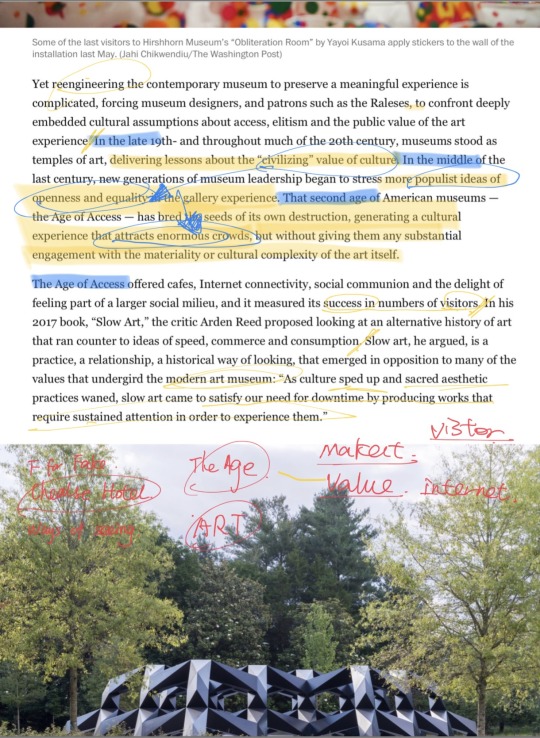

There is no doubt that this is a special art gallery that counters the current market environment, mechanized reproduction, and multimedia spreading. Glenstone tries to go back to the past, back to the time that camera were not becomed the eyes, the screen were not becomed the medium, and the market were not dominate the art. At that time, the relationship between art works and art galleries was mutually influential, and people were also influenced by the two. John Berger described people as “worshippers” go over to art works. Combined with the statement Rales said in this article, "Thinking." Yes, people can slow down in a specific environment, and then they can think more deeply.
I remember an artist who was dissatisfied with the communication of the modern era through the medium of the screen. He chose a lot of computer-generated images to be very complicated and abstract, and then made a lot of large-sized installations looked like made by machines but he made them by hand! The artist’s creation in order to express the modern media is unfair to artists hard working. Art works should not be enjoyed by instagram, by screen. But actually saying goodbye to mobile phones and the Internet can be said to be very rebellious today. I think that we can't abandon Instagram is true, in fact it even breeds a lot of new art forms.
Personally, I think when we walk into the art gallery, we can seriously stand in front of the work, or come up with a sketchbook. After I came to the United States, I went to the Metropolis twice. For the first time, I forgot to bring a sketchbook, took a lot of photos, and went home with my mobile phone and drew some interesting sculpture dynamics, and painted some great compositions in traditional paintings. However, this is a very strange experience, like Dejia's ballet girls which I found pictures on the Internet better than I shot, it made my trip to museum like no meaning. So the second time I took my sketchbook, it was really exciting, it seems like I was standing in the ballet classroom with Degas. Of course I still go back more times, with my sketchbook.
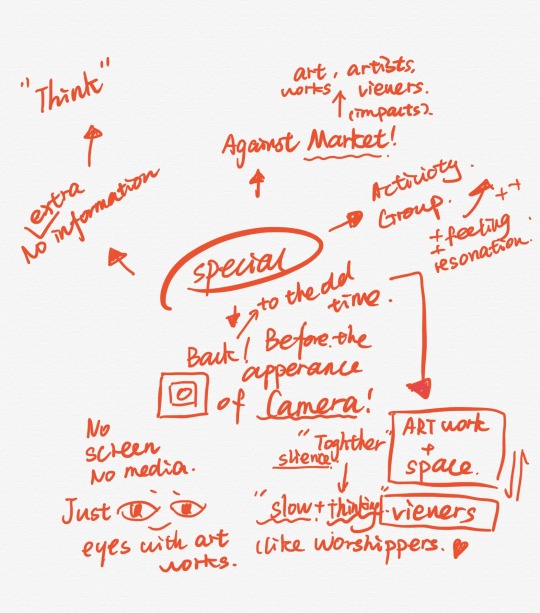
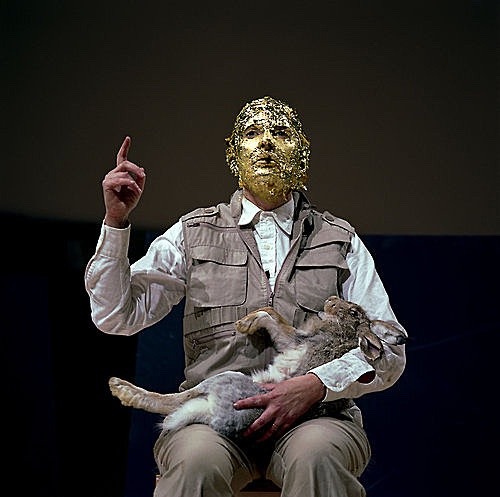
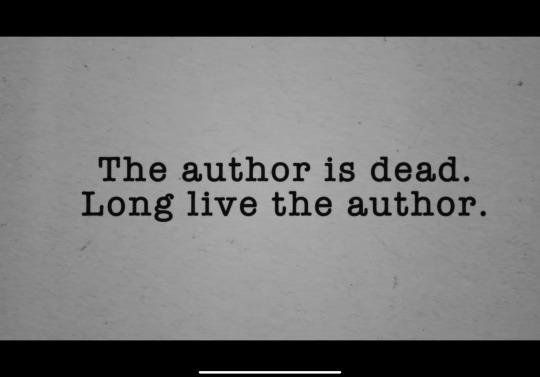
As for the way of exhibition, giving art works introduction or not, I can't think clearly now, which makes me want to think again what is the exact meaning of Joseph Beuys explained art to a rabbit. Perhaps every viewer in my future is the rabbit in the arms. I should tell them the story or let them go? According to Roland Barthes we should kill the author, should artists vanish themselves? For now, I think it should be different according to the situation. For Glenstone, this is a chain reaction, a clever setting, the concept of the venue is to let people slow down and think, a thousand people a thousand Hamlet, in such a space, slow freedom is the main purpose. Plus, people have difference in understanding of art can also add curiosity, which I think will make the viewer experience more interesting.
It lets me think about myself, actually I want to try this kind of creation, let me "disappear" (not involved in explaining the work), but such creation is very difficult. I am a visual animal, my works always maintain strong colors and multimedia, what if I never explain my story? I am afraid that viewers may be just feel “ It looks ok”. But I definitely need to create some work can give audiences initiative feelings. At the same time, the role of the tour guide is also very interesting. If the visitors are willing to follow the introductor's pace, they may hear interesting artist stories. My personal preference is to follow the guide worker and then look around by myself again.
I’m so confused about the art values for now, under going such market what is the real value for art works and artists??? The market has influenced the atmosphere of artists, when I read about the story of Chelsea hotel, I was shocked, artistic activities become comptetions and marketing careers. And the gallery and museum, more and more young people are attracted by fast marketing, in order to take photos and then post on social media. Like the movie The Nights of Museum, if art works come alive at night and chat together, there will be a voice saying, “I am sad that everyone did not understand me carefully, just standing and put a pose in front of me then leave”. So what are the meanings of the art works that fly through the ocean in those art galleries? I think this is the reason why we need “holy land” like Glenstone.
1 note
·
View note
Text
under a cut because long, disorganized, self-indulgent
ok so the Lende Empire isn’t really feudal; I despise feudal stasis in fantasy, like even the shortest timeline puts the Andal invasion at more than 2,000 ybp in Game of Thrones, you really think in all that time everybody on the continent is dumb enough to not invent a better plough? or glass just good enough to grind lenses? or make small improvements in windmill design? and all that shit adds up and BAM before you know it, you've got metallurgy good enough to make a steam engine with, so no matter what BS magical physics you come up with, if things work at the human scale even remotely like they do in our world, your age of knights and castles and dragons not having to contend with antiaircraft guns has a limited shelf-life.
(and that's interesting! And more people--by which i mean people besides Terry Pratchett, who did this wonderfully--should write about high fantasy worlds before they reached Medieval Stasis Mode, and after they left it! I would fukkin kill to read a good high fantasy book that also had, like spaceships in it. Insofar as genre conventions have evolved not according to the internal logic of the worlds they depict but according to how and for what reason they serve as commentaries on specific aspects of our own world and its history, and are aimed at evoking certain emotions, it's understandable why such generic mishsmashes are relatively uncommon. But people also definitely read speculative fiction because they like internally cohesive worlds very different from our own, so it is my fondest hope that this sort of thing becomes more popular going forward)
(you can of course also have fantasy worlds which are *not* very much like our own world at human scale. Greg Egan actually does this in a science fiction mode, but as long as you're positing a world where dimensions of space are hyperbolic like time or where humans change sex every time they have sex because trading a detachable symbiotic penis is part of having an orgasm, whether you call this stuff "different science" or "magic" is really beside the point. I have an idea I've been batting around for a while about a world divided, like Evan Dahm's Overside, or the two parallel worlds in Fringe, except part of the division is not just physical, but metaphysical. Morality itself in each subworld is defective, because each subworld got a different part of a morally and metaphysically unified whole: thus, for reasons nobody can understand, almost every ethical system derived by people resident in only one subworld is deeply defective, and would be horrifying to us--as though, perhaps, our own complex and nuanced moral landscape that we wrestle with was a kind of grand unified theory whose symmetry had been broken, and which was only understood piecemeal, as totally separate concepts. And of course, if you live in one subworld everyone from the other subworld is a horrifying monster whose morality is totally incomprehensible to you, so you reflexively treat them as an enemy.)
History isn't just one thing after another. I mean, okay, it is, but it's *also* the aftereffects of those things, the things that stick around forever and can't be gotten away from. And just like how if you want to understand our own world you need to look at what it was like five years ago, and to understand what it was like five years ago you need to look at what it was like ten years ago, and fifteen, ad nauseam, until you're suddenly back at World War II, or the Holy Roman Empire, or Sumer, or struggling through the ever-increasing fog of a steadily more ambiguous archeological record, well, this is as true for politics and language as it is the material aspects of society. In the same way maps feel insufficient when the artist doesn't think about what's beyond the edge of the page (not to knock on GRRM too much, but if you put all the continents and seas in his world on the same map, you notice they're all really... rectangular. Like he drew them to fit individual pieces of paper. Rivers and island arcs get compressed when they near a margin. Seas are just voids. Nothing ever has to be moved to a little box in a corner to fit. there's no attempt at verisimilitude), I think invented worlds feel insufficient when the writer asks you to take them seriously as a reflection of our own, or an aspect of our own, but neglects to at least suggest their place in a larger whole.
I wanted with the Lende Empire to have something that still let me have a lot of early centuries of sword-and-horse style adventures (because i started writing about Lende when I was thirteen and had just finished the Silmarillion for the second time), and I wanted when writing its history to still be able to take big chunks of story I stole from Norse legends and medieval poetry and dump them almost whole into the setting, but I also wanted the history not to read like a fantasy history--or not just a fantasy history. What I mean is, when you read something like the Silmarillion, or when a character in a fantasy world relates some legend to you, even if it's referred to as an old and ambiguous tale, you still often feel like that's really what happened. Like, for me, one of the chief emotional attractions to something like the tales of the wars of the Goths and Huns, or Beowulf's description of Migration Age Denmark filtered through Anglo-Saxon poetic tropes, or the Icelandic family sagas, is that we really have a hard time knowing how much of it is true, how much of its is plausible embellishment, and how much of it is anachronistic nonsense or pure bullshit. Is the Njala based on a faithfully recounted tradition passed down orally for a few hundred years? Who knows! Not us. We know a guy named Njal got burned in his house around 1000 AD, but much of the mystery and the poignancy of stories like that for me lies in the difficulty of ascertaining their relationship to the truth.
What I want(ed) was something that when you read it made you think "ok, obviously the narrator is trying their best, but even they don't know exactly what the fuck happened; this is probably one third ambiguous tradition, one third solid, one third bullshit." So the Chronicle of Lende has some stuff in it that's intentionally difficult to reconcile. It has weird tonal shifts. The first third owes a lot to the Anglo-Saxon Chronicle and the sagas and the Hildebrantslied; the middle is closer to the Silmarillion, or the history of Rome when told more from the Great Man perspective than the Impersonal Forces one, and the last third starts out that way but goes some weird places and veers off at the end to what is obviously a symbolic and highly abstracted mode of narration which, in relating the destruction of the Empire imitates the way in which its beginning is related (for in-universe Thematic Reasons), *but* while all this is going on, the hope is that the reader is *also* able to glimpse through these ambiguities and stylistic quirks, and incompatibilities, and weird digressions involving talking animals or the spirit world, a society that's undergoing familiar demographic and social and technological transitions: moving from oral culture agrarianism to the beginnings of a real urban civilization, with a centralized state and the written word, and like Western Europe having to figure out a social structure in the absence of any good nearby imperial models (they end up with something more like fraternal warrior societies being deputized to control land rather than feudal lords, but the essential logic is the same); but then moving to a real model of administrative statehood, as infrastructure and technology improve, before industrialization kicks off, the population explodes, social tensions inherent in that begin tearing at the seams of society, and the horrors of industrialized warfare are unleashed.
There are meant to be striking differences, too, of course. Lende history is only about a thousand Earth years long, and it's confined mostly to the western side of a continent split by a huge, Himalayan-like mountain range. Its rapid rise and increase in technological sophistication are due to exogenous factors (genuine divine intervention in some cases), and equally even the True Secret History of the empire's destruction has no real-world parallels, at least not since the Channeled Scablands formed 14,000 years ago. It's also teeeechnically science fiction and not fantasy, though that distinction really rests on tone and not on setting IMO. But I don't think it's possible to tell what feels like a real history of a world without sometimes radically changing genres: our own history goes from dry science (geology, paleontology, archeology) to legend and myth and scripture, to dusty old classical history and books penned by ancients who sometimes have startlingly different notions about what merits mention in a story and how to tell one, to tales of kings and queens and conquerors, before emerging blinking in the sunlight of dry matter of fact narration again. I have always believed conventions, including those of genre and style, should be tools and not straightjackets. The best worldbuilding literature I have read steals from a huge variety of sources (and Pratchett deserves a mention here again, alongside Susanna Clarke, and Ada Palmer, and the people who wrote the Elder Scrolls backstory, and Sofia Samatar, and Angelica Gorodischer).
#have you read a stranger in olondria?#go read a stranger in olondria#now#fucking do it#it's so good#'a book' says Vandos of Ur-Amakir 'is a fortress; a place of weeping; the key to a desert; a river that has no bridge; a garden of spears.'
13 notes
·
View notes
Text
“I Choose this Fate of My Own Free Will” - What Persona 3 Means to Me
As a forward, I decided to write this post after finishing my fifth replay of Persona 3. I didn't want to go too in-depth, but rather to focus on what particularly stood out to me as the most important elements: gameplay, design, and story synchronization, and the characters of Makoto, Aigis, Junpei, Chidori, Takaya, and Shinjiro. With that out of the way, I hope you enjoy!!
Persona 3 is a game unlike any other that I have ever played. When I began it for the first time on December 25th, 2012, I was in a pit of confusion and fear, struggling with abuse, isolation, depression, and anxiety. By the time I finished the game, on January 2nd, 2013, I was overwhelmed with emotions that would bring about the biggest change in the way I see the world any work of fiction has ever led me to. Even six years later, when so much media is unable to elicit response from me, it’s Persona 3 that drives me to tears again and again.
At first glace, Persona 3 wouldn’t seem much more than an edgy escapist experience for nihilistic teenagers. The emo design of the protagonist, the often rude and even callous dialogue options, the coffins, and most notably, the mock suicide used by the characters to fight. Yet, this initial impression hides behind it a genuinely heartfelt and anti-nihilistic message, hinted at from the start. The first screen of the game gives us this cryptic statement. “Time never waits, it delivers all to the same end. You who wishes to safeguard the future, however limited it may be, you will be given one year. Go fourth and do not falter, with you heart as your guide.” This is presented without ever receiving much explanation, but it sets the tone for what is to come. All throughout Persona 3, the shadow of death is present. The obvious places to point are Pharos’ visits to remind the player the end of the world is near, or the evokers and their aforementioned suicidal imagery. But it also does so in more subtle ways as well.
The theme “Mystic” plays at the beginning, when the player agrees to Pharos that he will “take responsibility for his actions”, and is reminded that “nobody can escape time.” From then on, Mystic plays in the background of the Tartarus themes. The theme of the first block is subtle, mysterious, and eerie. As the player climbs, the omniscient atmosphere grows. By the time of the final block, the music has taken on an intensive and foreboding feel, the shift building towards a gradual climax. Pharos’ statement that one can’t “close their ears or cover their eyes” is one the player is reminded of time and time again, and it can be felt that things in Persona 3 are building towards Makoto’s doom from the very start. While I can understand the oft repeated criticism of Tartarus as grind-heavy and somewhat generic randomly generated dungeon, it being a tower is the perfect way to metaphor for this inescapable fate. Each step up the stairs of Tartarus bring the player one step closer to their ultimate fate, one that, fittingly, can only be death. After all, what else does life amount to but one step forwards to death with each moment we all live? The game over screen serves as yet another reminder of this: “Death is not a hunter unbeknownst to its prey. One is always aware that it lies in wait. Though life is merely a journey to the grave, it is not one to be undertaken without hope.” Tartarus is the ultimate symbolism of this concept, even more so with the appearance of the Reaper. If one stays on a floor of Tartarus too long, they are reminded to keep moving forward, lest death take them before they have accomplished their mission.
Makoto Yuki is a unique protagonist. A mix of Japanese and Western RPG tropes, he is both his own character, and yet also an extension of the player. In many ways, Makoto has an individual personality that is portrayed subtly throughout the game. This can be seen in his design, in his unchosen reactions, in the range of options provided to the player, his turbulent but close friendship with Junpei, and in his bond with Aigis. Yet, the game also goes out of its way to reinforce the player’s identification with Makoto. In another oft criticized choice, the player is unable to directly control any character but him, even in battle. This forces the player to identify themselves as Makoto in particular, rather than as the puppet-master of the entire party. As mentioned before, his dialogue and certain actions are often controlled by the player as well. In this space the player is given to input themselves on to Makoto, the game ensures that we remain in his shoes, while also ensuring that the narrative purposes ultimately override player choices. In this implementation, the game is given unique control over its audience for narrative purposes.
From the start, the player is encouraged to expressing an uncaring worldview onto Makoto. When Pharos first states that the end of the world will soon come, one of the options is “I don’t care”. Indeed, why would the player care? Regardless of their thoughts on such a thing happening in reality, there seems little reason to feel invested in the fate of a fictional one. What more is the player there but to fantasize about being a hero, right? It’s natural to look at SEES and romanticize their struggle. In some ways, Persona 3 would seem to encourage this viewpoint, but it also questions it. Much of the game is focused on the motivation of the characters, on their varying opinions on the Dark Hour and on their lives in general. The player is given many views at which to approach the situation and of course, many options to express their own stance. Yet, the player can’t deny that their role is in that sort of escapism. The most on-the-nose comment is given by Junpei, trying to understand why he is angry at the thought of the Dark Hour vanishing, despite it putting a decent amount of people in a coma. “I talk a big game about fighting, but hell...it’s all I’m good for. If it weren’t for that...I’d be worthless.” Junpei cuts through the audience’s defenses with this statement. Despite their proposed hatred of the Dark Hour, many of the characters do feel a sense of purpose in their powers that is missing from their daily life. But can the players say much else for themselves? Even if it’s just a simulation, a game, why would one play it if not to fulfill something missing in their real lives? Would we really react much differently in their shoes?
It’s not until October that the game truly begins to turn this sentiment on its head. After a boss fight, Shinjiro is shot and killed. Killing a party member so soon after their active addition is an uncommon choice, in part because it essentially leaves any effort that the player puts into leveling them null. The most notable example is certainly Aerith from Final Fantasy VII, one that has become infamous for the reaction it invokes in fans of the game. Killing off Shinjiro makes clear that the game is willing to kill off major characters, and it breaks through preconceptions about plot armor, all the more prevalent in games, to remind the player that there is true danger in this situation. Shinjiro’s death also highlights the disconnect between those who have lost loved ones and those to for whom death is just a statistic or a news story. The other students are apathetic at best and disrespectful at worst. They don’t act unrealistically, or even too unsympathetically, but they clearly don’t grasp that Shinjiro was more than a punk. He was someone with friends, dreams, and a future. And can any of us really say we would think any differently? When we hear that some number of people died on the news, do we really see these people as individuals? I can attest that I at least would reasonably see such things in a very abstract way. The other students are not vilified, their comments are nothing that seems unlike what we ourselves might say. The fear of their own mortality leads them to distance themselves emotionally from Shinjiro, writing him off as a delinquent so as to paint him as "the other". But we knew Shinjiro, and so we see their comments in a different light. Makoto is given the option to tell the students badmouthing Shinjiro to shut-up, with Junpei joining him. It’s here that Persona 3 demonstrates a remarkable ability to shift itself away from the nihilistic view of the world that it once seemed to foster, while still demonstrating a balanced understanding of that view. This is reinforced again later in the game, when Junpei, the person who clung to the Dark Hour for his sense of purpose, loses Chidori to its violence.
Then there is Takaya, the man directly responsible for Shinjiro’s, and later Chidori’s deaths. Takaya is someone who has fully embraced the Dark Hour as his purpose in life. He is unable to let it go, and he doesn’t care who has to die to protect it. Takaya’s views are extreme, but hardly unrealistic. Much like a drug addict unwilling to accept the damage of their addiction, Takaya downplays and even justifies the Dark Hour as being benign. To him, that feeling of abstraction towards the death of others has become prevalent enough that he only seeks to protect what he believes makes his own special. When he discovers the world is soon to end, he is enthused. This sentiment is echoed by Ikutsuki, many NPCs, and is implied to have been a driving force behind those that created the Dark Hour. Predicting and even anticipating the apocalypse has been in vogue for generations now, and even my own Father once spoke of this to me: “When I was a teenager, people talked about nuclear war between the US and the Soviet Union. There was a part of me that found the thought exciting. The world ends for someone every day, but what a way to die in the absolute end of humanity.” My memory of this statement has allowed me to understand Takaya’s sentiment. When someone becomes disconnected from the world around them, from the mortality of themselves and others, they don't care about the consequences of their actions. Suddenly, the end of the world seems exciting rather than horrifying. Just before the final boss, Takaya forces the party once again to face the reality that their views were originally not so different from his. There is truth in this, as even Aigis admits, yet, they have realized then that they took their lives for granted.
January 31st is the first time that the player is given a choice of their own. Ryoji reveals that the end will soon come with the return of Nyx, the result of so many wishing for an end to the pain of life. He gives Makoto the option to killy him, erase his friends’ memories, and let live them in ignorance of their coming deaths. To refuse this offer is to face Nyx without any hope of success. It’s clear through the party’s gradually unanimous support for fighting Nyx where the game’s writers sided. However, Ryoji once again shows their ability to portray the opposing view in a sympathetic light. Ryoji genuinely cares for his friends and wholeheartedly believes that erasing their memories will save them from unnecessary suffering. In any case, there are many ways to interpret this question. The first time I played the game, I saw it as similar to my own thoughts on whether or not to give up on life and commit suicide. Did I want to struggle against my social, mental, and familial problems that seemed insurmountable, or did I want to give up, and go for one last hurrah before the end of my life? Death awaited either way. The only change was the what my life would amount to. The choice was mine - just as the game had said at the beginning. Whichever outcome resulted in the game, as in real life, was my responsibility to make. At the start of the game, I picked "who cares" as my response to Pharos. Truthfully, at the time, I may well have said the same thing in real life. And, in a decision I would have considered unthinkable when I began the game, I decided to let Ryoji live.
The heavy atmosphere of the game’s final month serves as a constant reminder of the decision made. It is during this time that my favorite Social Link unlocks - Aigis. Her Link focuses on in-depth exploration of what her arc had touched on throughout the previous months. As she had found greater emotional fulfillment in her life in the ability to make choices for herself, she had awoken to the fear of death, and of loss. To find the meaning and purpose she longed for in life was to also be aware of her limitations. Aigis is tormented by her inability to protect her friends, and her feelings of inadequacy as a lover to Makoto. Aigis’ struggle shows that to live with purpose is to live with awareness of how fragile and fleeting life is. To enjoy life, to love, is to open oneself up to the fear and pain of loss. Yet, is to live without enjoyment and purpose any life at all? This dilemma was faced earlier by Chidori, who had lived with apathy and detachment similar to Aigis’ before meeting Junpei. And just as Chidori was forced to confront a fear of death in her newfound love for Junpei, so to is Aigis in her love for Makoto. Ultimately, Chidori pushes Junpei away in an attempt to protect herself from these fears, as Aigis is similarly indecisive for how to approach them. Yet, in Junpei’s near-death, Chidori decides to sacrifice herself to protect him, ultimately deciding to accept and face her pain in order to live.
When the party reaches the height of Tartarus, they face Nyx Avatar. Here, the dialogue explicitly targets the audience. Mitsuru calls Nyx “what awaits all living things from the minute they are born.” Indeed, Nyx Avatar proclaims in the final stage of the battle: “it matters not who you are. Death awaits you.” There is no escaping that this applies as much to the player as to anyone else. When the fight against Nyx Avatar concludes, Makoto ascends alone to fight the true Nyx. With a remix of Mystic playing, he rises through darkness towards a bright light. This scene is reminiscent of the concept of one’s soul rising to heaven, as well as the description that to die is to see “a light at the end of a long, dark tunnel.” Finally, Makoto is face to face with the true Nyx, a ball of glowing light with outreaching skeletal arms. The symbolism makes it clear: the protagonist is facing the very incarnation of death itself. This is what every step up Tartarus, every second of the story has been building up to. Makoto stands alone against his doom. And yet, his friends’ cries of support reach him and give him the power to resist. Eventually, the protagonist gives up his HP to seal away Nyx. The metaphor is heavy, and yet, it is effective.
The ending of the game is, fittingly, where the message is truly brought home. In many ways, it seems almost euphorically happy. The characters regain their lost memories, and Mitsuru jumps off stage in slow motion as upbeat and cheerful music plays. The foreshadowing is there, however. The music that begins when we cut to Makoto with his head in Aigis’ lap is somber, and sorrowful. This scene gives us Aigis’ final resolution. She accepts her fears of losing Makoto, and promises to protect him and stay by his side. Just as nearly losing Junpei had done for Chidori, nearly losing Makoto allowed Aigis to realize the depth of her feelings for him. Aigis has firmly embraced that life is precious and worth living, rejecting her earlier fears that it may have been better to live without emotion. Of course, unbeknownst to her, this realization has come to late. Makoto succumbs to his exhaustion and falls asleep in her lap, never to wake up again. The ending song, Memories of You, expresses Aigis’ resolve to remember and love Makoto for the rest of her life.
Killing a silent protagonist is a rare choice. I have only personally played three other games that do so, though I’ve heard that a small handful of others exist. The belief that the main character of a story should be all but unkillable is a popular idea even outside of gaming. But when the character is meant to have an element of player insert, to kill them off is normally seen as too intense, and too on-the-nose. In Persona 3′s case, it is exactly what is needed to drive home the point. Much like the main character of fiction, it is easy to feel that we have something special about us keeping us alive. Indeed, we are the main character of our own tale, and for as long as it lasts, so do we. But someday our luck will run out and our journey will end, just as Makoto’s did. Makoto’s death reminds the player that nobody is immune to death, and our time will come as well. Nonetheless, Makoto is enough of his own character that we are also able to see his death from a more traditional viewer’s perspective. And in that, the joy of the party, the seeming upbeat nature of the ending, and Aigis’ promise to protect and stay by Makoto makes the loss all the more effective. The ones we love could be gone at any moment, and making it come for the party when they seem so close to a almost cheesy happy ending reminds us of this somber fact.
As Aigis expresses, the ultimate message of Persona 3 is that one can’t find meaning in life as long as they live in denial of the mortality of themselves and their loved ones. Doing so puts people on a path to self-destructive behavior. It is only by accepting the inevitability of death that one can realize just how precious and meaningful life truly is, and only by this realization can that we find true happiness. We see this truth firsthand in our own simulated experience. This is what makes Persona 3 so brilliant - it brings the player into the story in such a way that only a video game can. Say what you will about books, movies, television: for all the advantages these mediums have over video games, only a video game can show a player a fate that is of their own choosing. Yet, no matter how much pain the ending may cause them, it remains undeniable that the player has, in a sense, contributed to the very sentiment it seeks to deconstruct. It’s what drew them to the game in the first place.
Persona 3 develops from a story that uses suicidal and edgy imagery for the adrenaline rush into one that heavily deconstructs and averts these very concepts. By doing so, it encourages the player to re-evaluate these ideas. At the very start, Mitsuru gives a speech telling the students of the schools to dig deeply and re-evaluate their convictions. During my first playthrough, I did just that. In the days, weeks, and months following, my suicidal thoughts dropped drastically and gradually trickled down to nothing. January 2nd now serves as a constant reminder of how I make the choice, of my own free will, to live. So many still see Persona 3 as a depressing and bitter story, like the emotionally disturbed younger brother to Persona 4′s unabashed positivism. It is anything but. Rather, Persona 3 is the most candidly and genuinely optimistic game I have ever played, and it is thanks to it that I was able to find the courage and the hope to move forward from the darkest time of my life.
4 notes
·
View notes
Text
What I learned about God
Since I was neither a pastor or a philosopher, my take on God might seem unprofessional. As a layman thinker my take on God will seem simple to some, but since many who might read this may also be of similar learning, perhaps my insight on the Almighty might have some revelation.
In this world of diversity, we see a lot of people who have different views on God as well as names they believe are his name. Just as there are so many different cultures and races, we also have an assortment of beliefs or lack thereof.
The God I believe in is the one that comes from the Bible; his living word. Some skeptics are willing to say that the Bible is just a fabrication of fallible men and shouldn’t be taken as holy scripture and written through inspiration from God to man. It shouldn’t be a surprise or a shock that people should doubt the bible, despite the fact that it is one of the oldest, most accurate, and best selling book in all of history. Despite this, many still will say that the word of God is nothing but human imagination.
I find that odd cause when I often tell people how the Bible to me is also a source of earthly wisdom, they scoff at the notion as well. When one reads the Bible, even if they are not a believer, the words are alien to our form of thought. There is a great deal that scripture conflicts with what we think or believe such as the concept of forgiving those that hurt us. Jesus himself said, “for if you forgive other people when they sin against you, your heavenly Father will also forgive you.” (Matthew 6:14, Mark 11:25, John 20:23 NIV). Scripture tells us that instead of being bitter and hateful to those who are against us, we should, in fact, forgive them. How on earth can an earthly man consider such a thing? How could fallible men write about something that other fallible men couldn’t comprehend or consider ridiculous? Such a contradiction should be obvious to anyone who tries to read the Bible: If it is not wise to us, then it must be of God. For is it not written: “For the foolishness of God is wiser than human wisdom…” (1 Corinthians 1:25 NIV). So if the bible contradicts human wisdom, perhaps it is of a wisdom not of this world, hm?
The truth of the matter is that we all believe in God. Deep down there is that part of us that acknowledges something greater than ourselves. Even an Agnostic or Atheist believes enough in God to attempt to dismiss him. The problem is that our beliefs are as diversified as the cultures, races, nationalities and gender orientation this world carries. We still, however, carry that one tidbit that is ingrained into your psyche: We all acknowledge in some degree to a creator.
This doesn’t necessarily mean that what everyone perceives God is true. Our various religions and beliefs all differ and how we see the world beyond us ranges from the sublime to the strange. Some people believe we all just become reunited with some abstract godhead and become one with the universe. Others believe we just reincarnate and how we lived our past life determines what our new life becomes.
As for me, I see my faith in God a bit differently. Like I showed before when I compare what the bible says about how we should worship God and conduct our lives, some will see that as stupid. The reason why so many people can’t or won’t understand the bible is cause it doesn’t follow our current way of thinking in this earthly world. Maybe that’s why I feel like the God of the Bible is true—because maybe God, who sees all and knows all, thinks in ways we can’t fathom in our earthly intelligence. Maybe cause God is something more than just an abstract force or being, he might know something more than our linear thinking minds can grasp.
God’s Holiness
A lot of argument can be heard regarding certain subjects in the bible. For instance, there was a story in 2nd Samuel about a man named Uzzah. Now according to the story, King David was taking the ark of the covenant, which was the holiest relic to the Jews. Now while they were transporting the ark, The cart it was carried in started to wobble and the ark was about to fall. Uzzah, reached out to grab the ark and kept it in the cart; however, God was angry with Uzzah and he smote him dead for touching the ark. David didn’t like that either and this story tends to see God as rather petty and mean for smiting someone who was just trying to prevent the ark from falling off and being damaged. So why did God do this?
The answer that came to me in my walk comes in the power of God’s holiness. Holiness describes the aspect of God where he is the ultimate embodiment of moral and physical purity. You can wash, disinfect, bleach and scour yourself until your raw and bleeding, and it would not be close to the level of purity that God contains.
Think of Holiness as the sun, a massive burning ball of churning hydrogen in the middle of space. The sun’s light and heat warm and illuminates the earth with life-giving power, which symbolizes the holy energy from God. However, That light and warmth when you get to close to it can wind up both blinding and utterly destroying anyone or anything that comes too close. God is so holy and pure that coming in contact with anything that possesses a shred of that holiness would be destroyed by it. This, in my opinion, is why Uzzah died, not because of his concern for the ark, but because God’s holiness could not be handled without being killed by it.
Moses’ interactions with God are a good example of God’s holiness and its effect on sinful mortals. When God first visited Moses as a burning bush, God told him, “Draw not nigh hither: put off thy shoes from off thy feet, for the place whereon thou standest is holy ground.” (Exodus 3:5). God openly warns Moses not to come near because his holy presence would do Moses harm. Further on, when Moses was receiving the Ten Commandments, God himself was to come down to write on the stone slabs. When Moses seemed excited to see God face-to-face, God warned instead, “Thou canst not see my face: for there shall no man see me, and live.” (Exodus 33:20) Another proof that God could not be seen by mortal eyes without being consequences.
So many would imagine God is being arrogant about not being seen or touched by others, that not being able to see him didn’t make him feel real. The reality of it shows that God is actually doing it for our benefit; rather than having us destroyed by his presence. Of course, that would change somewhat later on, as I will talk about in the next chapter.
God’s Omnipotence and Omnipresence
Omnipotence basically means “All-powerful”, which states that he can do anything. If you really sit back and think of what that means, It really makes you think about who God really is.
As a student of animation, I see God as an artist, and the canvas he paints on is our existence. God exists outside of the canvas and paints upon it, creating and fabricating a beautiful work of art. He is not bound to the confines of that canvas, and the Canvas cannot dictate to God what he should or shouldn’t paint.
“In the Beginning, you laid the foundations of the earth” (Psalms 102:25) Which tells us how God was the creator of the Earth. However in the book of Job “For his eyes are upon the ways of man, and he seeth all his goings.” (Job 34:21). Also in Proverbs, “For the ways of man are before the eyes of the Lord…” (Proverbs 5:21)
The same goes for God in our universe. He exists outside of the scope of time, space, and existence—primarily because he created them. Because he created it, he can tell it what to do and not the other way around. We cannot dictate to God that we should have been born as Brad Pitt anymore than a fly can tell God it wants to be a man. If God can do whatever he wants to what he creates, then that gives me a good idea about what makes God all-powerful.
This also has the benefit of his Omnipresence, which is the concept that he can be everywhere and anywhere in the universe. It falls back to the same analogy as the canvas. Since God created all of the universes from his perch in heaven, it stands to reason that he also sees and exists in the same space. He can look at that canvas and see the stars and planets, even the minute details of Earth and the creatures that dwell on it. Every brushstroke that he made is there for him to enjoy.
God’s Omniscience
Time to us seems linear and static. We currently exist, and we remember memories of the past and look towards the future. Sometimes we see the future with uncertainty and dread. We are born, lived and eventually die. Such is the nature of Time to us.
As I mentioned in the previous section, I describe as best I can how God sees existence like an artist paints on a canvas. God, in the same way, sees Time somewhat differently than we do since he exists out of time—I mean, he did create time after all. “‘I am the Alpha and the Omega’ says the Lord God, ‘who is, and who was, and who is to come, the Almighty.’” (Revelation 1:8) Through this, we see that God states that from the beginning of creation to the end, he is always going to be there since he exists outside the time he created.
Imagine if you will a flipbook: one of those old paper books that when you thumb through them rapidly, creates the illusion of movement. Now imagine that flipbook as depicting your entire life, from birth to death. We as finite beings in that flipbook can only perceive them now and remember what was. We cannot look forward to the end of the book. God, however, existing outside of that flipbook, can. In fact, he probably sees it more as taking the flipbook apart and laying out the individual frames all in a neat orderly set and can see everything from beginning to end.
God once spoke to the Prophet Jeremiah, “Before I formed thee in the belly I knew thee; before thou camest forth out of the womb I sanctified thee…”(Jeremiah 1:5 KJV) This can only be possible that God would have an awareness of time that only a being that exists outside of time could have. And if God could do this for one of his children, that means he knows all of us before we were born—He loved us even before we ever were born, and he knows when we will live and when we will die. One who meditates on such a statement must also wonder what an intimate depth God knows about us, as well as makes us aware that God knows what we are going to do in our lives. That is why God loves us so much.
Since God who exists outside of time can see the flow of time in our lives, can he not see the beginning and the end of our world? Though my analogy may seem simple, It makes me think of just how different God perceives all of existence from his God-eye view than from our short-sighted senses. “He has made everything beautiful in its time. He has also set eternity in the human heart, yet no one can fathom what God has done from beginning to end.” (Ecclesiastes 3:11)
6 notes
·
View notes
Text
KHR 065: Motivational Tomatoes
Before we get back to the action, this chapter featured the first-ever character poll results, and do you know who got first place?

That’s right! This is the one and only time he will ever make it into the top two, let alone beat out his beloved boss (and it wasn’t even close). The rest of the character poll results are here, for anyone who enjoys these things and feels validated (like I do) when other people also like their fave.
Moving on to the chapter!

I can’t believe Gokudera fucking died right when he was voted the most popular character in Japan.
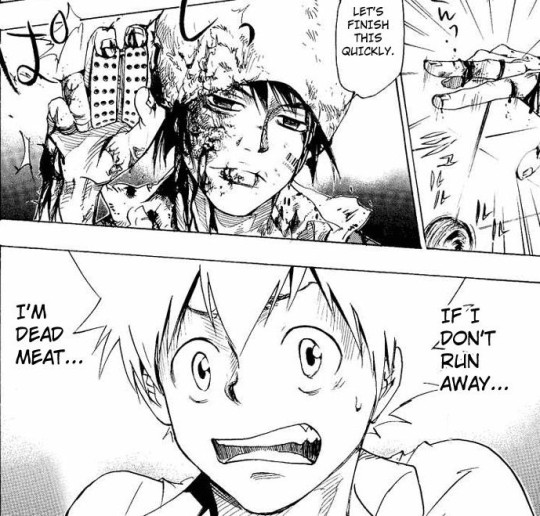
THIS WAS A COMEDY MANGA
Honestly, it’s fascinating to see Tsuna freeze up in a situation like this. I think it might be the only time it ever happens? Before this arc, he had never been in a situation this bad. And after this arc… well, we all know he’s a bit of a changed man after this arc.
But for right now, he’s useless! At least he doesn’t just straight up abandon Gokudera, though.
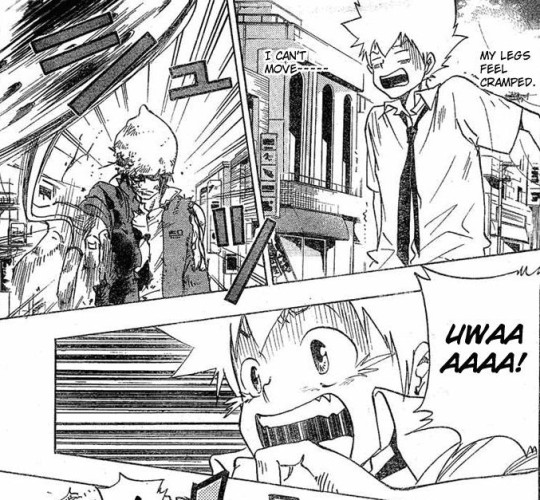
This would be a great time for a really handsome fellow to make a flashy entrance.


I honestly don’t know how this smiling idiot never made it to #1 on any of the polls. Criminally underappreciated. Who do I have to fight to get him the respect he deserves.
On a side note, Tsuna’s expression when Yamamoto is going “WHE-W” is legendary. It’s such a perfect “Ohmygod what just happened… am I dead??!” look. No, Tsuna, you’re alive! You were saved by this fucking guy who’s got the best timing since the fucking T-rex at the end of the first Jurassic Park.
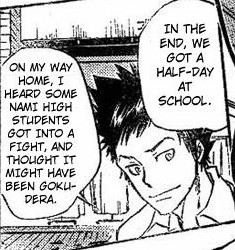
I can’t really blame the school, given that half its student body is currently laid out missing all their teeth. If anything they should have been closed to begin with.
Those girls from the previous chapter are just walking all over the damn town complaining about this fight. Bless you, girls.
I freaking love how Yamamoto hears “kid in a fight” and immediately thinks, “Gokudera.”
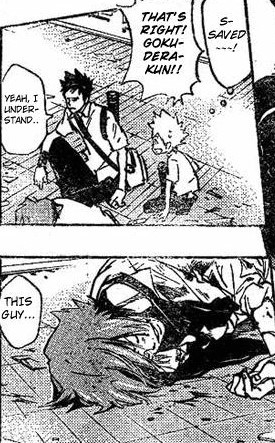
NOOOO MY LITTLE BOY [PETS HIS HEAD] [CALLS 911] [CALLS SOCIAL SERVICES] [ADOPTS!!] [KNITS HIM A WEASLEY FAMILY SWEATER!!!]
DAMN IT LOOK AT HIM JUST LYING THERE QUIETLY WITH HIS WRIST ALL FLOPPY AND HIS HAIR IN FRONT OF HIS EYES FUCK ME
Fortunately, Yamamoto knows how to express this exact same mood, but with like 1000x more aggression.
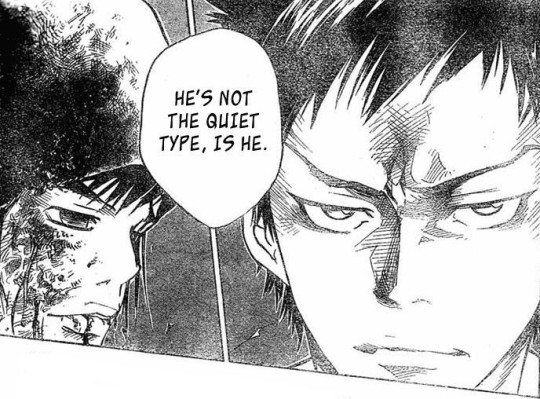
I’m not sure when exactly I started shipping 8059, but I do know that if I wasn’t already, after this panel I was all aboard that ship ready to never set foot on dry land ever again.
Also, Yamamoto is so fucking awesome Jesus Christ.

WHICH MAKES IT SO MUCH BETTER!!!
Also, later on in this chapter there’s a scene where Yamamoto cheerfully refers to it as “the mafia role-play” yet again, but you are kidding yourself if you think there’s any chance that this little murder butterfly, freshly emerged from his natural born hitman cocoon, actually believes it’s a game after this scene. GOKUDERA DYING IS NOT SPECIAL EFFECTS. I 100% believe he’s only playing along because it’s simpler that way.
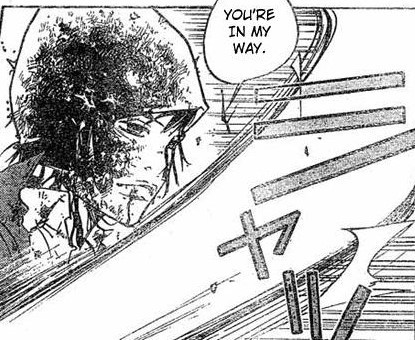
Look at this idiot. Word of advice: if Yamamoto ever looks at you with that sort of expression, YOU FUCKING RUN and don’t look back. Better yet, don’t hurt his boyfriend in the first place and it won’t come to this.
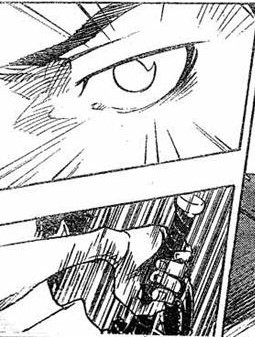

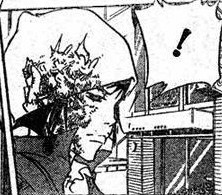
ARE YOU WETTING YOUR PANTS YET CHIKUSA??

HE’S SO ANGRY sob I’m living for it so much! Also, of COURSE he’s number two on the list. Of course he is. Second only to Hibari. At least Fuuta fucking appreciates how amazing he is.


Let’s be real, he just knew Yamamoto was ready to kick his ass from here to ten years in the future.

SAVE HIM OH MY GOD!!!
CUT TO NAMIMORI JUNIOR HIGH
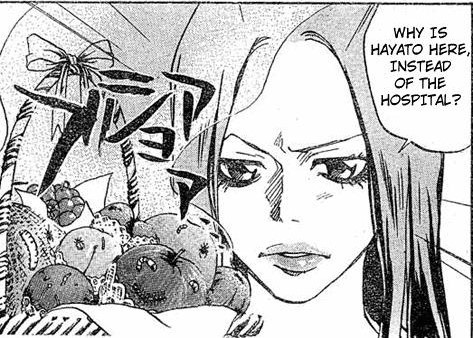

This makes me wish we could have gotten some sort of really tense, Godfather-esque hospital fight scene at some point in the series. I would have enjoyed that.
Anyhow, interesting that they have no problem sending the characters to the hospital in later arcs, even when it’s arguably just as dangerous (most notably during the Inheritance Arc, when someone had obviously tried to kill Yamamoto, and was still out there). So clearly, Gokudera only gets sent to the school in this instance so Shamal can be there to remind us all how useless he is. Even though he does save Gokudera’s life by treating the poison. I GUESS.

That’s going to go over real well.

Gokudera’s life in a nutshell.
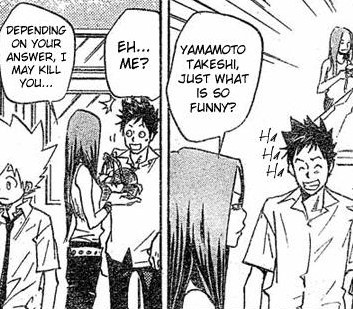
I freaking love how Bianchi is constantly trying to pick a fight with Yamamoto Takeshi, the world’s nicest human. I like to think it’s because she already knows he’s going to marry her brother one day.
Yamamoto’s Chopper-esque deer-in-headlights look needs to be framed and put on my wall.

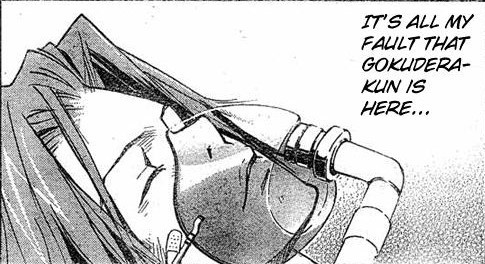
“Did you think we were done with the angst?” Amano asks, a sadistic gleam in her eye.
I was actually praying that we weren’t! And my prayers were answered.
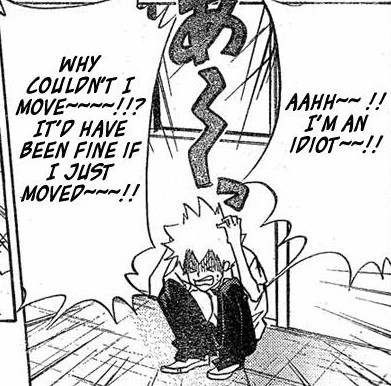
YES TSUNA, BEAT YOURSELF UP OVER IT. LET THAT GUILT FLOW THROUGH YOU. LORD PLEASE LET NO ONE COME AND RUIN THIS WONDERFULLY ANGSTY MOMENT.


WHY CAN WE NEVER HAVE NICE THINGS IN THIS MANGA
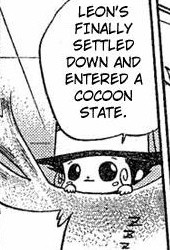
Is he a lizard? Is he a caterpillar? Where did he come from? Why does he exist?
These are things we don’t question. Just accept and move on.

WE REALLY COULD HAVE USED YOUR HELP WHEN GOKUDERA WAS FUCKING DYING


“The most terrible of mafia criminals”, oh and also, later on, a bunch of (mostly) innocent kids whose ancestors once casually made a deadly and irresponsible bet. (I say ‘mostly’ because Kaoru was guilty of ATTEMPTED MURDER. NEVER FORGET.)
This is officially the first mention of the Vindice, though. Sure would be hilarious if these guys ended up being the final villains or something wild like that.
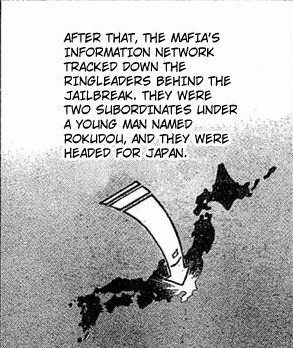
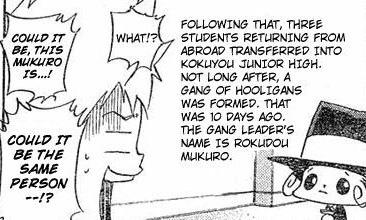
Yes, of course they’re the same person. Why would Reborn randomly be telling you about two completely unrelated Rokudo Mukuros?
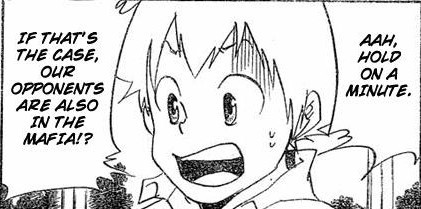
OF COURSE THEY’RE IN THE MAFIA. WHERE ELSE WOULD KAKIPI BE HAILING FROM. THE INTERNATIONAL YO-YO FEDERATION? YOU REALLY THINK THE IYYF HAS IT IN FOR NAMIMORI STUDENTS FOR SOME REASON
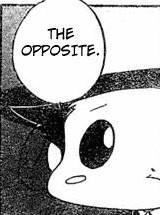
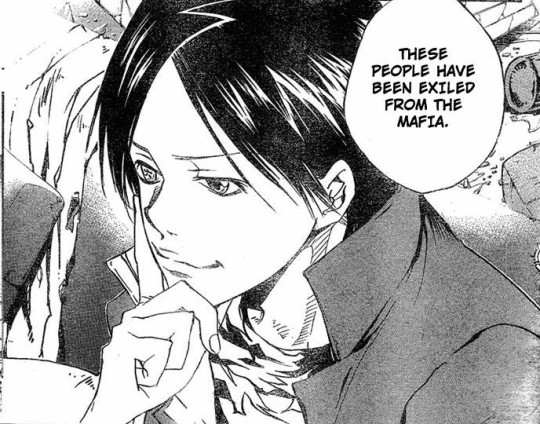
Nah it still counts as mafia.
Hey, it’s Mukuro! What an elegant transition.
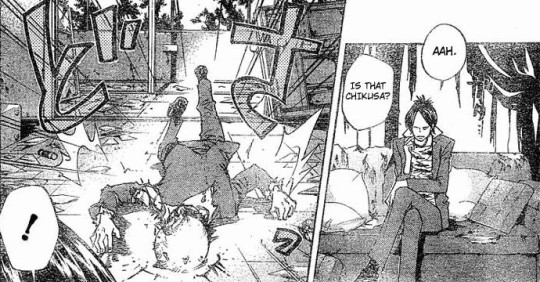
[INSERT NEYMAR JOKE]
Mukuro goes on to act really callous here, but take note of that “!” bubble above his head when Chikusa flops to the ground. Is he just surprised, or is could it possibly be… concern????? I honestly don’t know, so let’s just say it’s both, with him then proceeding to go all-in on the show of amused apathy right afterwards to hide it.

Oh yeah and he’s also excited because Chikusa’s finally gotten them a lead.
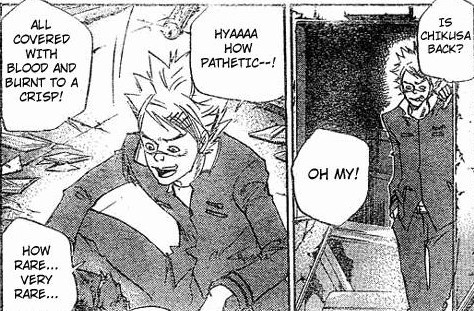
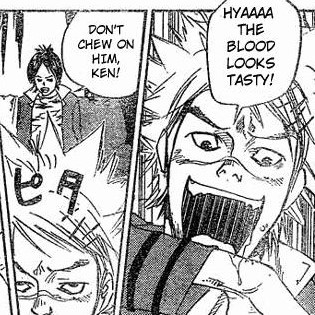
Were you seriously going to eat your friend why are you guys such shitheads in this arc.

I guess… he’s got a lot of faith in Chikusa, at least? Man, compared to this, Gokudera suddenly seems amazingly well off, even with his lack of a hospital, his doctor that doesn’t treat men, and his sister who’s more likely to kill him than cure him.
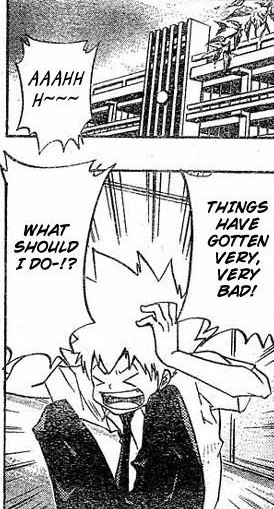
Reborn, please talk some sense into this spiraling young man who needs to be dragged into his leadership role of destiny by force if need be!
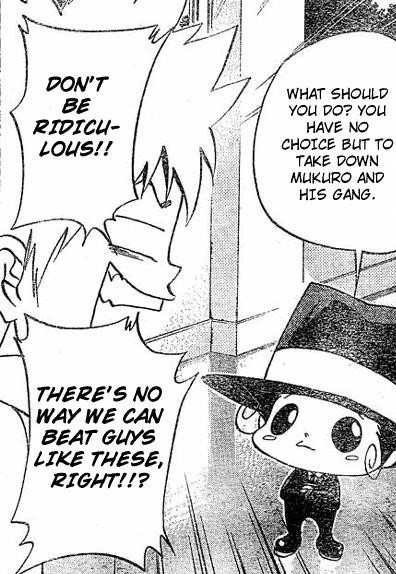
In all fairness, he doesn’t know he’s going to be a fucking superhero by the end of the day.
At any rate, Reborn is not the only one who thinks it’s finally Tsuna’s moment to shine!
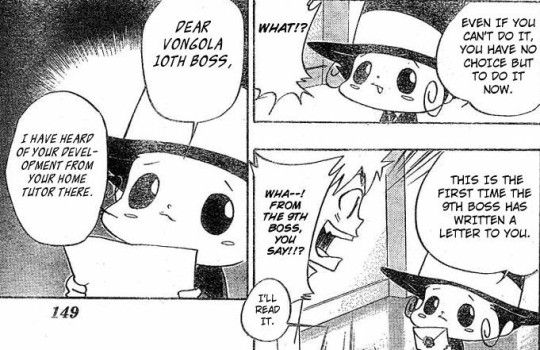
I would kill to see one of these reports from Reborn to the Ninth. Tell me someone has written a fic about them. I’m obsessed with this.

Twelve hours?? Geez no pressure.

100 YEARS WORTH OF TOMATOES.
Tsuna. Now you gotta.
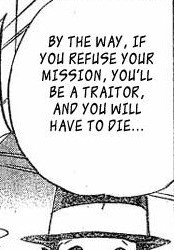
Now you really gotta.
Haha. The Ninth is sitting there at his desk like, “What should I say to motivate him? How about tomatoes? Everyone likes tomatoes. But just in case, I’ll also threaten to kill him if he says no.”
As we all know, at this stage of his development, Tsuna is fucking great under pressure, so he immediately pretends he hasn’t heard anything, screams that it has nothing to do with him, and runs off in a panic.

Which is actually exactly what he needs to do to end up getting a reality check!
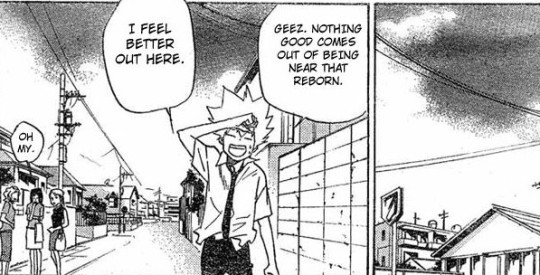
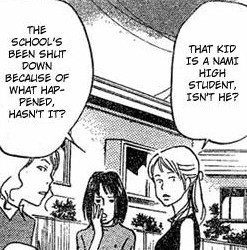
NO IT’S NOT

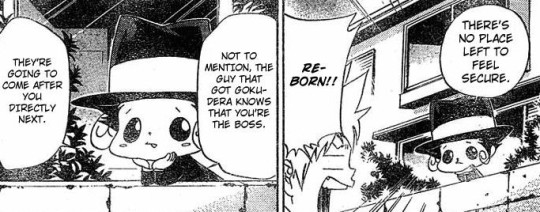
This is exactly why Reborn is the tutor and the Ninth is just the old guy with money. “Rather than seducing him with tomatoes, I’ll just remind him that no matter what, he can’t escape this shit anyway, and if he sits around and does nothing he’s fucking screwed.”
Like, it sounds cruel, but it’s exactly what he needs to hear. Along with this.
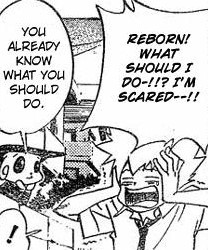
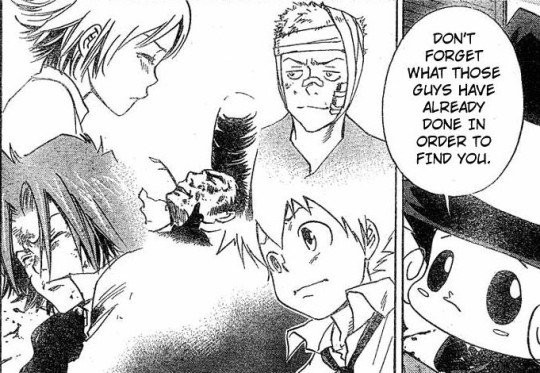
Things I love:
Reborn’s complete faith that deep down, Tsuna already knows the right thing to do.
Reborn understanding that there’s a layer of fear/panic/anxiety that he has to cut through in order to get to that essential core of Tsuna. (I mean, that’s the very concept of the Dying Will bullet right there.)
Reborn knowing exactly what to say to activate that inner strength.
Tsuna’s scared-but-resolved face when he thinks about Ryohei and Kyoko and Gokudera.
The fact that Kusakabe is included in the montage (s-sob).

One day I will write an essay about how I believe that this single sentence sums up Reborn’s entire endgame for Tsuna in a nutshell. And when I say “endgame”, I mean endgame endgame. As in BOSS endgame.
Seriously, he’s known from the start that this is what propels Tsuna. Not fame or power. Not even “purer” abstract concepts like ~the greater good~ or ~doing the right thing~. It has to be personal; it has to be his friends, his family, someone that he cares about. Because he is thirteen, and still self-centered, and so right now, something like this is the only thing that can break through that layer of teenage apathy and reluctance. The threat has to be real and close and tangible, and it has to be personal.
And even later on, when he’s matured a bit more and is saving the future and junk, this is still the key motivator. Tsuna has so much potential to be a force for good and light and hope in the world. But if you want him to be a damn hero, you have to give him someone to save.
OR JUST GIVE HIM TOMATOES

Look at the gritted teeth. It’s working.

This is Tsuna’s equivalent of that Yamamoto rage face earlier in this chapter. Look how different it is. I love this about Tsuna.

HIBARI WASN’T ACTUALLY THE MAIN CHARACTER, THOUGH
Reborn! Tell him!


MOSTLY DEAD IS SLIGHTLY ALIVE!!!!
Half an hour after being killed, Gokudera returns good as new! Reading this chapter for the first time, ten-years-ago makeste breathes a sigh of relief that her favorite character isn’t going to get left out just when the series is finally having a real fucking arc. We got our angst and the happy ending too! BOOM, did it, had it both ways no regrets.

[INSERT MONTY PYTHON REFERENCE]

YAAAAAAY

YOU KNOW FULL WELL IT’S NOT

AND MY AXE
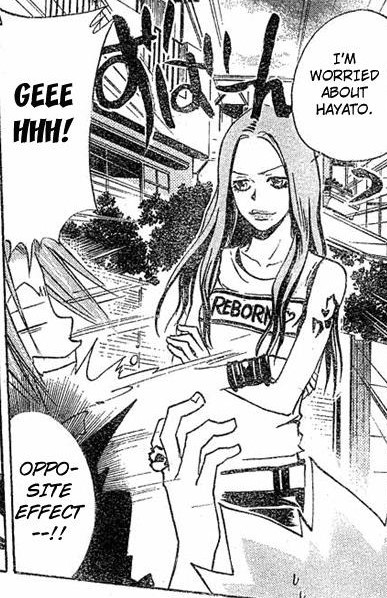
AND JUST LIKE THAT HE’S FUCKING DEAD AGAIN
This may just be the greatest sequence of entrances in history.
Back when they had so few fighting characters that they needed to toss in Bianchi as a fourth. Those were the days.

You shall be the Fellowship of the Rings… wait, no, that’s next arc.
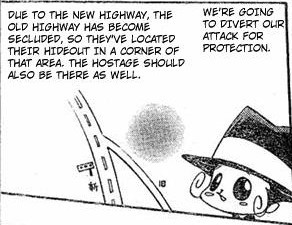
I don’t know why we needed a fucking roadmap to understand this plan of “we’re going to their hideout”, but okay.
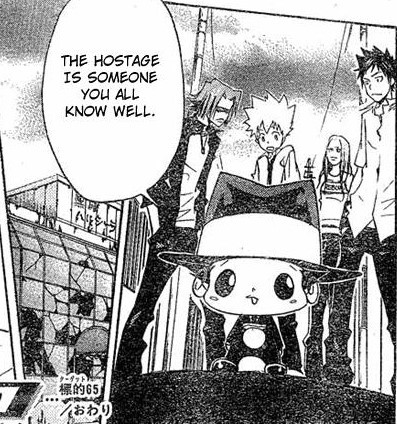
OHO, INTRIGUE
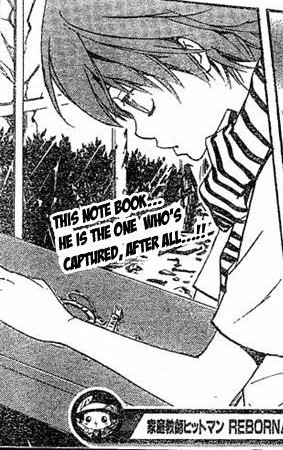
It’s Fuuta!
That’s right, friends! In addition to Hibari Kyoya, Mukuro has also kidnapped an eight-year-old. He’s so evil!
…But redemption is coming for you, you pineapple-shaped kufufuing motherfucker. Just you wait.
#khr#katekyo hitman reborn#yay old chapter#sawada tsunayoshi#gokudera hayato#yamamoto takeshi#bianchi#reborn#rokudo mukuro#I'll save you the trouble of skipping ahead to the end of this arc which is chapter 81#in the end#despite doing everything the ninth asked of him#tsuna does not in fact ever get those tomatoes
50 notes
·
View notes
Text
I Liked Fates Before It Was Cool!: The Opening
Prologue
Here begins my run of Fates, in which I react to things that I believe merit either praise or criticism and that hopefully haven’t been thoroughly picked over yet hundreds of times by everyone else in the fandom. I’ll be doing each route in the sequence I used last time, with gameplay details to follow as they come up. To answer @damoselcastel, I’ll be doing an all-male run, and it does indeed suck that the game screws this over a bit at the very beginning by forcing me to take Felicia over Jakob first. Breeding will come when I feel like it, more to have extra chapters to play through than anything.
Prologue

In what I assume will continue to be a series trend going forward, all of the 3DS FEs open somewhat in the abstract, including a flash forward to a future event. Fates’s particular take is both the most surreal and the least dependent on shock value, as the events it depicts are only several chapters away rather than near endgame. Azura picks up her Lady of the Lake associations right from the start, there’s a very early glimpse at what will be eventually revealed to be Valla, and Ryoma and Xander and Xander’s ludicrously acrobatic horse square off to set up this setting’s central conflict. The chapter proper is (fittingly) dreamlike, with surreal music and a high-energy scenario that begins in medias res and doesn’t entirely follow the normal rhythms of FE combat. I have absolutely no idea how this would come across to a newcomer to the series - I got my hand held through Lyn Normal Mode, cut me some slack - but I imagine it would be disorienting.
Chapter 1
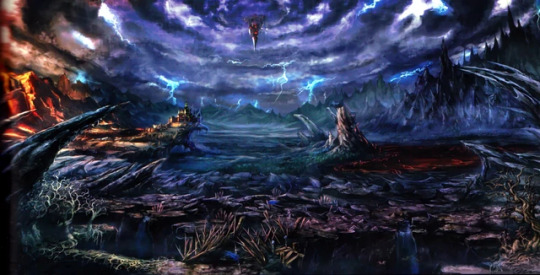
That’s apparently official concept art of Nohr. Reasonable worldbuilding, what’s that?
The in-game presentation starts off rather less absurd. Hell, if it weren’t for the ominous castle rooftop setting of Xander’s training session one could almost find Corrin’s slice-of-life interactions with their servants and their Nohrian family quaint. Xander is just a drama queen like that. This fight calls back to Path of Radiance and New Mystery, which also start off with training sessions against significantly more powerful named characters. For Birthright it also forms a narrative bookend, but I’ll get to that in due time. I have Feelings about the presentation of Xander...and not just because he’s my husbando either.
I like that Corrin’s retainers are domestics first and combatants second unlike those of the other royals, because it stresses that they’ve been isolated in a non-combat role during their upbringing, their exposure to Nohr’s allegedly spartan military culture limited to sparring with Gunter and Xander. I have no idea how that would be enough for them to survive when they evidently live in Mordor, but then Nohr is the source of the most consistently sloppy worldbuilding in Fates so at least we get that established right away.
Oh, and Lilith is here. There’s never a point anywhere in this game where Lilith’s character is competently handled, so I have a tendency to forget she exists unless she’s on-screen. Here she’s just an unassuming stable girl with an unusual design, and Elise makes an incestuous insinuation in her direction that’s only funny if you played the appropriate DLC.
Chapter 2
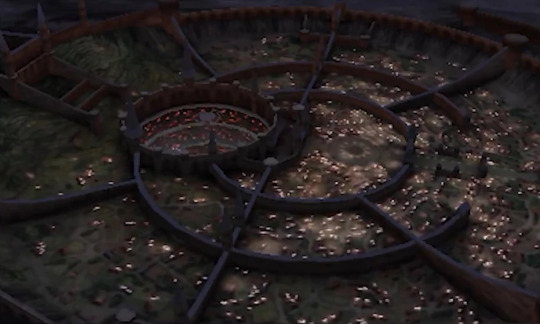
Structural contrast with the towering Hoshidan royal palace aside, I don’t entirely get how Krakenberg works. A dragon did it?
Anyway, Corrin gets an under-explained and clearly evil magical sword from his shamelessly homicidal father only to balk at the thought of killing anyone with it. Leo salvaging this faux pas isn’t the silliest example of Corrin not understanding the basic concept of lying - it’s presumably easier to fake someone’s death with magic than with a giant sword - but it’s definitely up there. The Nohrian royals on the other hand have no trouble with such things based on their traumatic but mostly implied experiences at court. Important to note that everyone here up to and including the prisoners of war calls out Corrin for their sheltered worldview; their development from here on out really is dependent on the player’s choice of route. I vastly prefer this approach to Awakening’s for explaining why the Avatar is such a relatively blank slate - almost no amnesia necessary this time.
And while they appear in most chapters, I want to praise Dragon Veins here for being a really cool concept that doesn’t get as much love as it should. Draconic or otherwise superhuman bloodlines in FE are usually expressed in gameplay with the ability to wield certain legendary weapons, and while that also makes an appearance in Fates Dragon Veins represent more dramatically visible utility. They really make a difference in some chapters, and I’d like to see them reuse the concept in future games where it would be a logical addition (which would be most of them since humans with dragon blood pop up all over this series).
Chapter 3
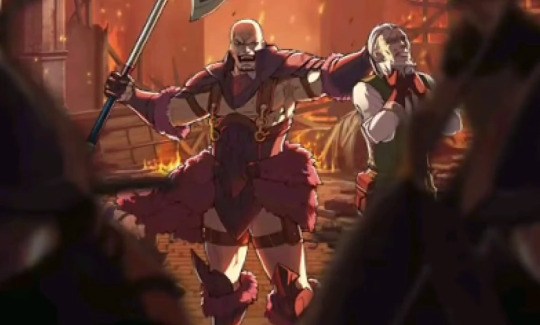
I chose this image because I want everyone to appreciate as I do that Hans dresses like the world’s most tasteless leatherman. A harness and straps that show off all the wrong bits, and it’s in purple. Not even the overall weirdly fetishistic look of this game’s berserkers can excuse that.
But aside from that, Hans sucks. Iago also sucks. Less characters than plot devices that pop up whenever there’s a need for someone to act completely despicable to move the conflict along, there’s no way to spin them in a way that sounds like they contribute anything positive to the narrative. Case in point: in this chapter Hans single-handedly reignites hostilities between Nohr and Hoshido by Leeroy Jenkins-ing his way through the chapter and later (possibly) killing Gunter, with the only interesting caveat that he claims to have done so at Garon’s behest. And sure, Garon is also flat over-the-top villainy incarnate, but he at least has gravitas and a master playing a long game that arguably succeeds in two of the routes. Hans and Iago are just two more in the line of FE villains with flat motivations and personalities who lack even the good grace to be attractive, but unlike Desaix and Darin and Chagall and others like them they stick around in the story long after they’ve worn out their welcome. Did Nohr really need not one but three flat antagonists in its ranks around for most of the game?
I haven’t even gotten into the first appearance of Camilla’s...issues surrounding Corrin or whatever the dimension-hopping hell Lilith pulls with her invocations to presumably deceased dragon “gods” now that she reveals her true form. This is really the first chapter to offer a hint of how disjointed and frequently contrived Fates’s stories are going to end up, saved only by the very end when Rinkah puts this game’s new blunt weapon category to its logical use. Not like the game wants us to feel bad for Corrin....
Chapter 4
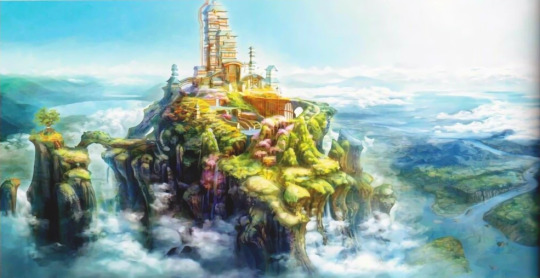
...because Hoshido is paradise. And also Takumi.
Everyone knows the story, both as it’s explicitly told and as can be read through the lines. The writers weren’t afraid to let their biases show, the localizers and the Western fandom did a fair amount to mitigate that with some bias of our own, and the final product is one big mess that fails to make logical sense in-universe and teeters on the edge of real-world two-way racism. Here we’re introduced to Castle Shirasagi, glimmering and verdant and awash in cherry blossoms, as well as Azura, Corrin’s foil in Stockholm Syndrome. But it’s all good, because Mikoto is tranquil and peace-loving and enforces her tranquility through a plot contrivance magical barrier that is just one of many examples in Fates of magic not working the way it does in the rest of the series (or at least I can’t think of anything else like this, correct me if I’m wrong). We don’t learn just why Nohr is so hellbent on invading Hoshido that they’d resort to summoning soulless monsters to do so until much later (and only in Birthright of all routes!). For now they just sound like unprovoked aggressors, and the Hoshidan royals Corrin’s true and loving family.
However, what I really wanted to bring up for this chapter is how oddly it’s structured, such that it never fails to throw me off a bit. It opens in an unnamed Fire Tribe village in a snowy area of Hoshido, which might I mention is the only point in the game we see anything of the Fire Tribe other than Rinkah herself. Considering all the time we spend in multiple routes with the Wind and Ice Tribes, that lack of detail strikes me as peculiar. Kaze then brings Corrin to the Hoshidan palace where Ryoma and Mikoto reveal the truth, then it’s immediately back to the snowy north to rescue Hinoka and Sakura from Faceless before returning to the palace to meet Azura. Was there any reason the Faceless fight couldn’t have happened before Corrin left the village, and the reveal and trip to Shirasagi left for after the chapter map and partially in response to Hinoka’s OOC crying fit?
I also hate maps where high-powered NPCs go around stealing kills. Kaze barely got to see any action this chapter, poor guy.
Chapter 5
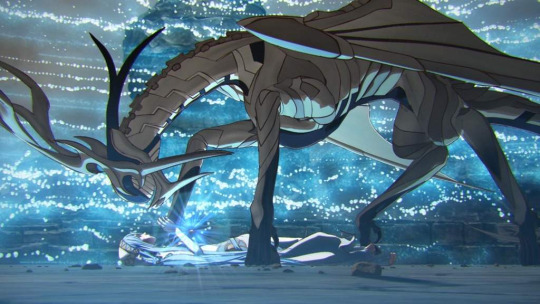
Props to this manakete design, which is unlike anything else in the series and manages to work in elements of Anankos and Corrin’s weird outfit. No props to the scripting of the thing, as after this chapter Corrin may as well not even be a mankete except for gameplay purposes (which are minimal anyway unless you need them to tank something). You’d think learning that you can turn into a dragon would leave more of an impact on...anyone really, but nope. I guess it technically becomes relevant again in Kana’s paralogue, but that’s as tangential and ultimately irrelevant as everything else involving the kids.
There’s a lot else going on in this chapter, but I’m sorry to say that neither Mikoto’s death nor the obliteration of a large chunk of Hoshido’s capital lands as powerfully as they were meant to considering Corrin and the audience have spent all of 1.5 chapters with these people. This isn’t anything like Elbert or Greil’s death scene or even remake!Rudolf’s for that matter - at least that one came with a shocking twist that was responded to appropriately. It’s hard to even appreciate these events from the perspectives of the Hoshidan royals because they’re still pretty new characters in the player’s mind, though with the hindsight of Conquest I can maybe sympathize with Takumi here at the beginning of his downward spiral.
Corrin also picks up their legendary sword in a way that feels extremely random. I guess the Yato was inside the statue that got blown up? Weird place to keep a divine peace-bringing relic, that’s all I’m saying.
Branch of Fate
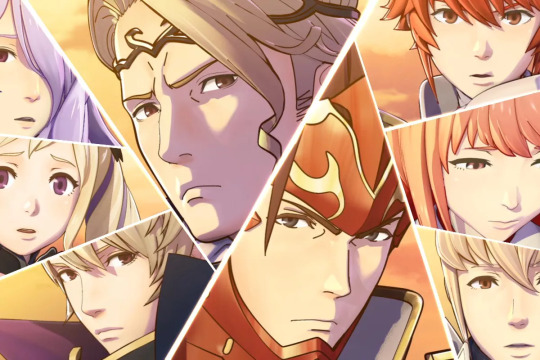
Despite some early warning signs and a few slight missteps, I’m happy to say that this story moment works. It’s a good thing that it does too, as this is the defining moment of FE14 in everything from its marketing to its game design to its core themes. The setup is rushed and tense and allows only Corrin, i.e. the intended player self-insert, full knowledge of the weight of the choice put before them, as none of the other royals are aware that they are all in a way family to the person they’re now abruptly forcing to pick a side. Familial connections (biological or otherwise) may not be a narrative hook that grabs me personally, but nonetheless this scene sticks with you. There is no easy choice, and the consequences of any of them immediately define the direction of the story.
This is not to say that all three of the iterations of Chapter 6 that follow succeed equally well, but that’s for other posts...including the next one, which will kick off Birthright.
Next time: Birthright Chapter 6 - 11
12 notes
·
View notes
Text
Calvis Duvide - Troublesome Tyrant

@chaoticevilfantrolls
(Heard you were doin Trollsonas)
Planet: Alternia, AU where Cusp Bloods exist and are considered more or less average trolls, and the age of conscription is 10 sweeps.
Name:Calvis Duvide
To be honest, Calvis doesn’t have much of a specific meaning, beyond being a preferred lengthening of my own name.
Duvide comes from the term L'appel du Vide, which means Call of the Void in French. In psychology, L'appel du Vide is a term referring to the urge to do self-destructive things without a distinct cause, like the urge to swerve off the road while driving or to jump off of a high place. Additionally, Calvis is a void player who feels drawn to the void as a sort of comfort.
Calvis is a good name and I definitely prefer to keep it around. Now… keep track o’ this leap of logic I’m going to do here to also justify it, but Calvis is also plural for Calvus, which can serve as a reference to Constantine Calvus, a Scottish monarch who attempted to change the rules of succession of the throne and who qualified as heir, which fits with some of Calvis’ behaviors. It can also be a reference to Altolamprologus calvus, a common aquarium fish. And, lastly, a reference to Cumulonimbus calvus, a type of cloud that can look a little, uh… eldritch, sometimes.
Yay for retroactive justification!
Age:9.25 sweeps
Strife Specibus:This one is a little tricky. Because Calvis is a trollsona, I’m drawn to giving him either bladeKind or knifeKind, as those are actual real weapons that I own and am reasonably skilled with? But at the same time, something more thematically relevant like cardKind (tarot and playing cards) might be nice?
I’ve also given him pipeKind before, using both a smoking pipe and also literal lead pipes ala Russia’s cane from Hetalia. That’s more relevant to a massive trollsona generator me and a friend of mine made that was based on the natal astrology chart.
I definitely think in the case of trollsonas, you should go with what you feel a draw towards. If you like blades, if you feel an affinity towards blades, I’d go with that.
You could also do the very void player thing and not have a traditional strife specibus so to speak. You’ve got a character here who seems good at talking his way into things, and who’s good at justifying his logic and having a lot of information, so maybe he could primarily rely on talking instead of fighting?
OR you could have him utilize the tooth he wears, since that’s a nontraditional weapon that relates to his title and because it could be utilized in a way that’s a nice callback to his/your interest in tabletop games. You could utilize it like a fear spell, an intimidation roll, or even something like vicious mockery or hideous laughter. Do that psychic damage, Calvis.
Fetch Modus:Polyhedral Modus
Calvis’ items are stored in a set of polyhedral dice (1d4, 1d6, 1d8, 1d10, 1d%, 1d12, and 1d20). It’s sort of a relic from when he was much more into playing tabletop rpgs. It’s purely random what item he receives, which is why he puts items he retrieves more often in the lower-sided dice. Funnily enough, his modus becomes more troublesome to use the more he embraces his aspect, stepping away from fortune to accept the unknown and nebulous.
So many spots in his sylladex are filled up with items based on former or current interests, among other things that he would rather just… hide from others in general.
Oof, I’m imagining the frustrating ordeal of rolling a d4 and landing on 1 six times in a row.
Blood color:Violet-Fuchsia cusp. The blood color is based on a blood color test that determined a hexcode value from numerical values based on personality traits of each color group (red, green, and blue). He’s kind of in a tricky situation, being just below the cut-off for fuchsia, but definitely redder than most violets.
In the session he’s from, he’s actually in a kismesitude with the proper fuchsia (seeing as they don’t have the biological imperative to kill each other, only really squabble like idiots), who has abdicated his position as heir and given it to Calvis.
Hmmmm… I’m going to go ahead and assume you’re talking au where the cusps are still viable instead of the more established canon, so that I won’t have to fiddle with this and ruin your good fun.
If I were going to push it into the canon range, though, I would say that him just bein a standard violet who picks up the fuschia helm for his kismesis can work about as well.
And if I were suiting him to your au where dual blood traits present in trolls, I could definitely argue that with nowhere else to try to represent both sets of traits uniquely, his body just kinda fell in the middle.
Symbol and meaning: A combination of Eris and Pittarius from the extended zodiac. Eris is the goddess of chaos and discord from Greek mythology. Eris is also the name of the second largest dwarf planet in the orbit of the sun, just after Pluto.
Erises’ ma is Nyx, The Night, which is extra fitting. Child Of The Night is a great way to describe a void player. The planet Eris is also part of The Shattered Disk, which sounds cool as hell, and also means the planet has high eccentricity. Relatable, really.
Trolltag: cynicalTeuthida
Cynical: Concerned only with one’s own interests and typically disregarding accepted or appropriate standards in order to achieve them. I mean. He kind of manipulated his kismesis into naming him the heir, just because he could.
Teuthida: Name of the taxonomic order containing squids. Mostly a reference to his lusus and 100% absolutely wholesome appreciation of tentacles.
I think we all need to wholesomely appreciate tentacles more, if I’m being honest. …But now I can’t stop thinking about Calvis having those weird New England Aquarium ad campaign posters hanging up in his room totally wholesomely.
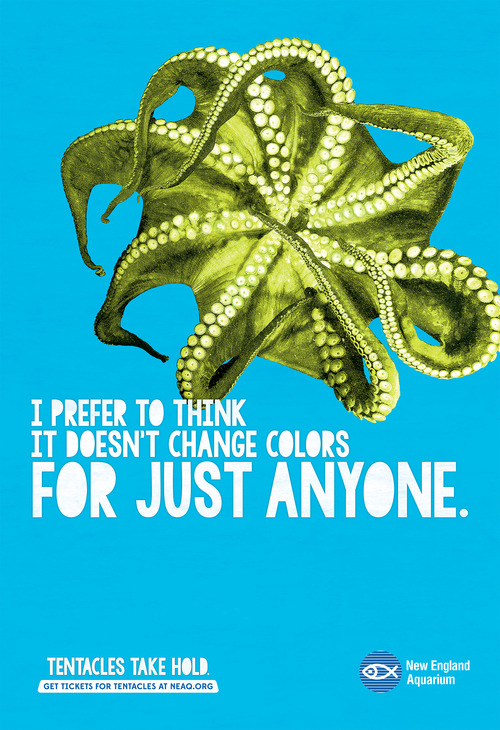
Quirk:Because Calvis is a trollsona, he has sort of a simple quirk, based primarily around my personal manner of typing.
He types in almost exclusively lowercase, only capitalizing the first letter of words to emphasize them. He also has a tendency to misspell things by cutting off the last letter or last couple of letters. He surrounds his text in pointed brackets, but otherwise uses little punctuation besides commas. Expect a lot of typos from him in general, which he won’t really bother fixing.
CT: <the quick brown fox jumpped over the lazy dog>
Hmm. I do like it but I wonder if something more tentacly might be fun. {like using curly brackets instead}. It’s not really a big enough deal to stress over, but just a thought. }}=o Also check it out I Just made a betta fish.
Special Abilities:Like most seadwellers, Calvis is ridiculously strong. Probably even more so than average, given that I myself, as a puny human being, can lift about 400 lbs. He’s also able to withstand changing between salt and fresh water, actually preferring the briny water in the lake surrounding his hive to anything else.
The idea of an extra strong seadweller scares me because Feferi is capable of dragging a whale.
Lusus: L'lythro, a minor eldritch being that lives in a fish tank in the underwater portion of Calvis’ hive. L'lythro is known as the Denizen of Madness, and the source of the horrible whispers that fill the forest surrounding Calvis’ hive. Because of L'lythro’s terrible mutterings, the forest is believed to be haunted or cursed, known for driving lowbloods to madness or worse.
It’s hard to describe L'lythro as anything besides a graphical glitch in the universe, sometimes taking the form of an amorphous puddle of eyes, teeth, and slime, and sometimes taking the form of an abstract concept of patterns. Calvis doesn’t mind. He loves them no matter what nebulous and unknowable form they take. He actually wears one of L'lythro’s teeth on a chain as a necklace, which carries enough residual psychic discordance to give him an unsettling aura.
…A fun fact here is that while trying to google this name I discovered a “fossil fighters” character named The Gore King. That’s not relevant I just had to share or the knowledge would eat at my mind forever. Anyways I like this, continuing the tradition of eldritch lusii pals.
Personality: The best way to describe Calvis is ‘ecclectic’. He finds it hard to focus directly on one pursuit or another, flipping from interest to interest to endeavor to interest. Even now, as he nears the sweep of his conscription, his interests tend to branch out so much that it’s hard for him to even begin imagining what he could possibly make of himself…
So he doesn’t.
He spends most of his time collecting knowledge on whatever bits and bobs he can find, no matter how trivial, looking for some kind of validation of his intellect and talent. He reads and writes extensively, creating entire worlds he scraps once he’s become bored of them. He picks up games and hobbies like tabletop gaming and knitting only to drop them weeks or moments later. The only real consistency to him is the fact that he’s outright unpredictable.
He can come off as a bit cold and callous, not really caring about the emotional aspect of things until it directly involves him, in which case he will get much, much too involved. He can come off as overbearing in some situations, forcing his good will down others throats so he’ll have something to parade as evidence of his virtue.
Despite all of this absolute poncery, though, Calvis has quite a few good and sympathetic traits, no matter how much he lets them get overshadowed. He’s insightful and careful. He’s legitimately kind and gentle with the few trolls he can be bothered to care for (even including his kismesis at times). He’s just going through a bit of a rough time, nudging him gently toward his Crisis in one way or another.
I like how a lot of his traits come through as validation-seeking- which is a trait you mentioned up top but which really manages to carry through. I think if you want to carry the light/void theme and push his inversion, definitely increase his desire for Attention more. For Acknowledgement.
Interests: Calvis has many, many interests, but not so many that he’s actually stuck to.
He legitimately loves betta fish, especially for their bright colors and feisty attitudes. He has multiple fish tanks throughout the above-water portion of his hive, each tank filled with a small ecosystem dedicated to each of his fish. Most of them are named after snack foods. Don’t worry, he doesn’t eat them… just the fish flakes he feeds them. Don’t judge.
Calvis also enjoys collecting and decorating his hive with items of significant eldritch imagery. Teeth and eyes and tentacles are the motifs he chooses to decorate the walls of his hive with. Some of it comes off as quite lewd, not that he cares or notices much.
The rest of his interests, like collecting bladed weapons, knitting or crocheting, playing tabletop games, or writing, tend to be on-and-off. He picks them up again whenever he’s bored of what he was working on before.
Oof, cycling through interests is also relatable. He’s a fantroll, so I can’t exactly recommend More Interests. ……..Maybe roleplay-
Also sorry I’m just going to share one more of these ad posters because I can’t stop fucking looking at them.
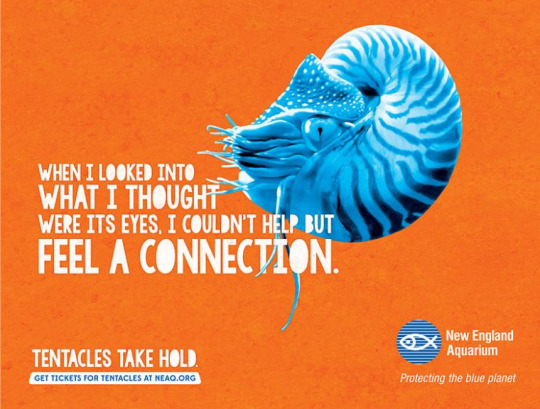
Title: Bard of Void
Calvis acts more like a Maid of Light initially, relying on his kismesis for any real chance of power, yet finding luck and fortune a natural and powerful tool to his whims. He will leap at any opportunity to provide information about any topic he’s even remotely versed in, and he has a peculiar penchant for getting the right card or number when he needs to in games of chance, smirking sadistically all the while.
As he progresses in a session, or even matures as a person, he begins to accept the role of the unknown and mysterious, letting himself let go of his aggressive need to know everything, learning to go with the flow. He embraces the potential of the void, learning more about the origins of his lusus in the process. He loses out on some of his luck in the process, but like, yaknow, who cares about the outcome, man? It’s all the same in the end.
I know you’re not so keen about suggesting alternative god tiers for Trollsonas, but I did want to provide my reasoning.
I think even if we did tend towards suggesting alternatives for trollsonas, I definitely wouldn’t. Learning to embrace the void and kind of accepting the solace of the blank sheet and getting out of the need for the limelight, the need to take the reigns and try to guide others, the despair at not Knowing what the future holds or what he wants the future to hold… It’s definitely a good route for this trollsona, narratively.
Land: Land of Butterscotch and Tentacles
A massive desert of sugary tan sand populated by light purple Illithids, full of incomplete temples to the denizen Cthulhu. Calvis actually has two possible routes for his quest: completing the temples and receiving Cthulhu’s blessing, or dismantling them to free the Illithids from his control.
Ooh, always interesting. I do have to wonder why butterscoth tho, LOL. Sounds tasty.
Dream Planet: Derse? I prefer Derse just for the void connection and such.
Oh yeah, he’s super derse. Derse is in his blood.
Design:
Hhhonestly there’s not really a lot I would edit about his design? Violets/fuschias are high enough up that they can get away with wearing just about anything, really. If I had any recommendations, it might be to adjust the color of the undershirt or try out horns more similar to the traditional Heir Horns (hehe), but then I don’t know what Horn Rules you’re going by in your au.
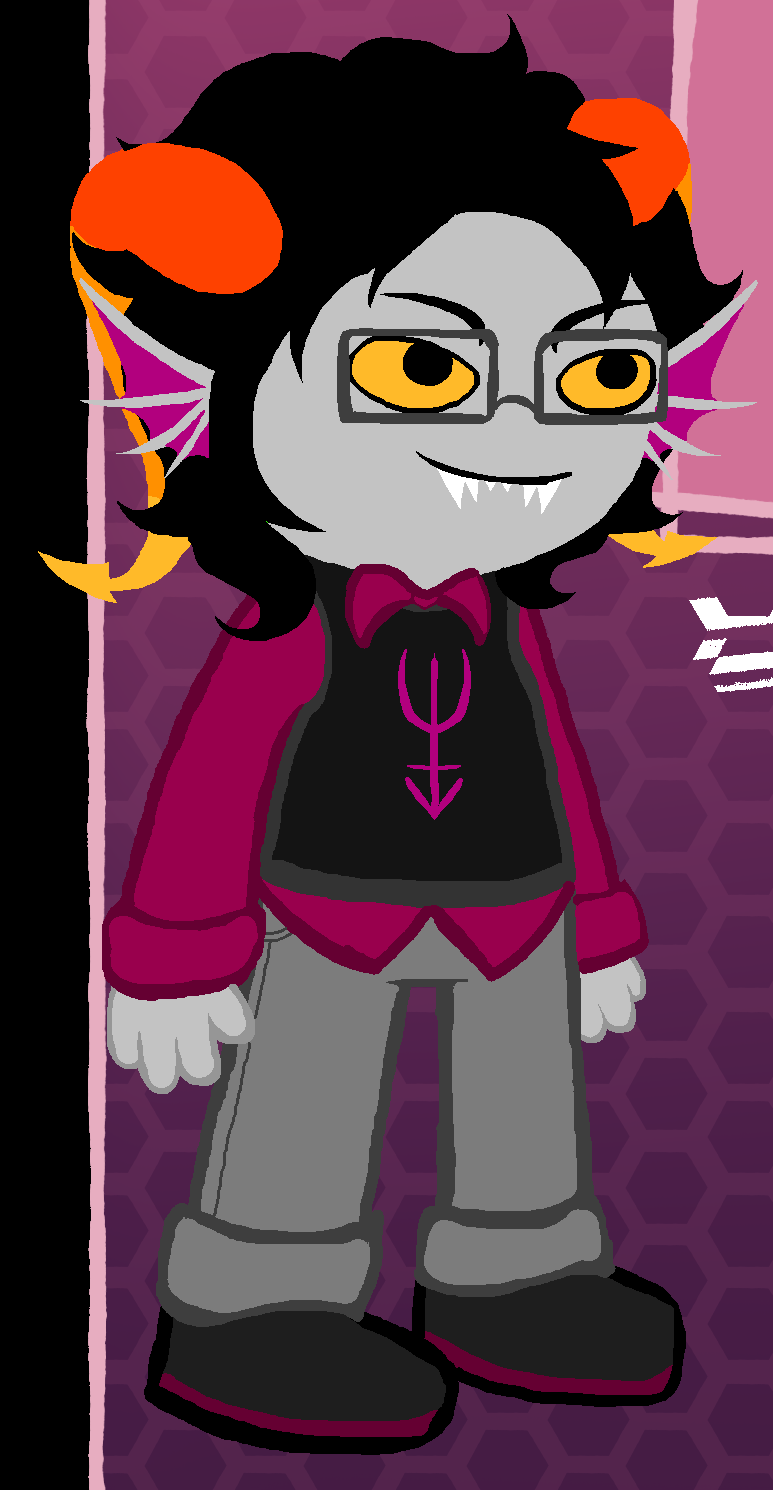
Here you see me playing with changing his shirt color to a true tyrian. I think it makes more sense- it’s a way to acknowledge his kismesitude with the fuschia- and, since he’s trying to overtake the heir position, it makes most sense for him to try to visually associate himself with the fuschia role.
He’s a really well balanced trollsona! Thank you for sharing!
-CD
#chaoticevilfantrolls#calvis duvide#calvis#duvide#violetblood#fuschiablood#?#review#cd review#submission
2 notes
·
View notes